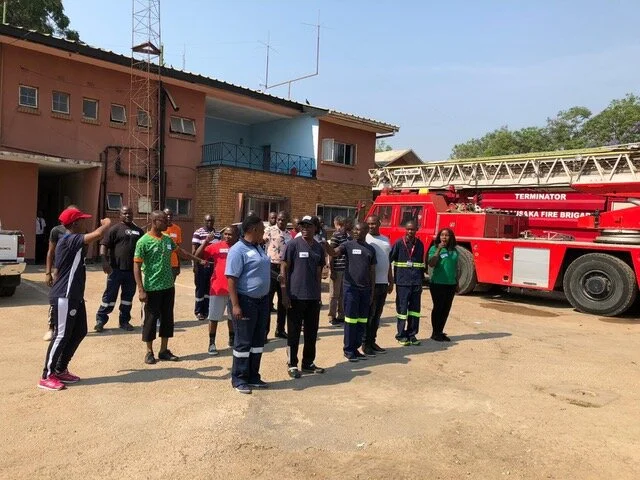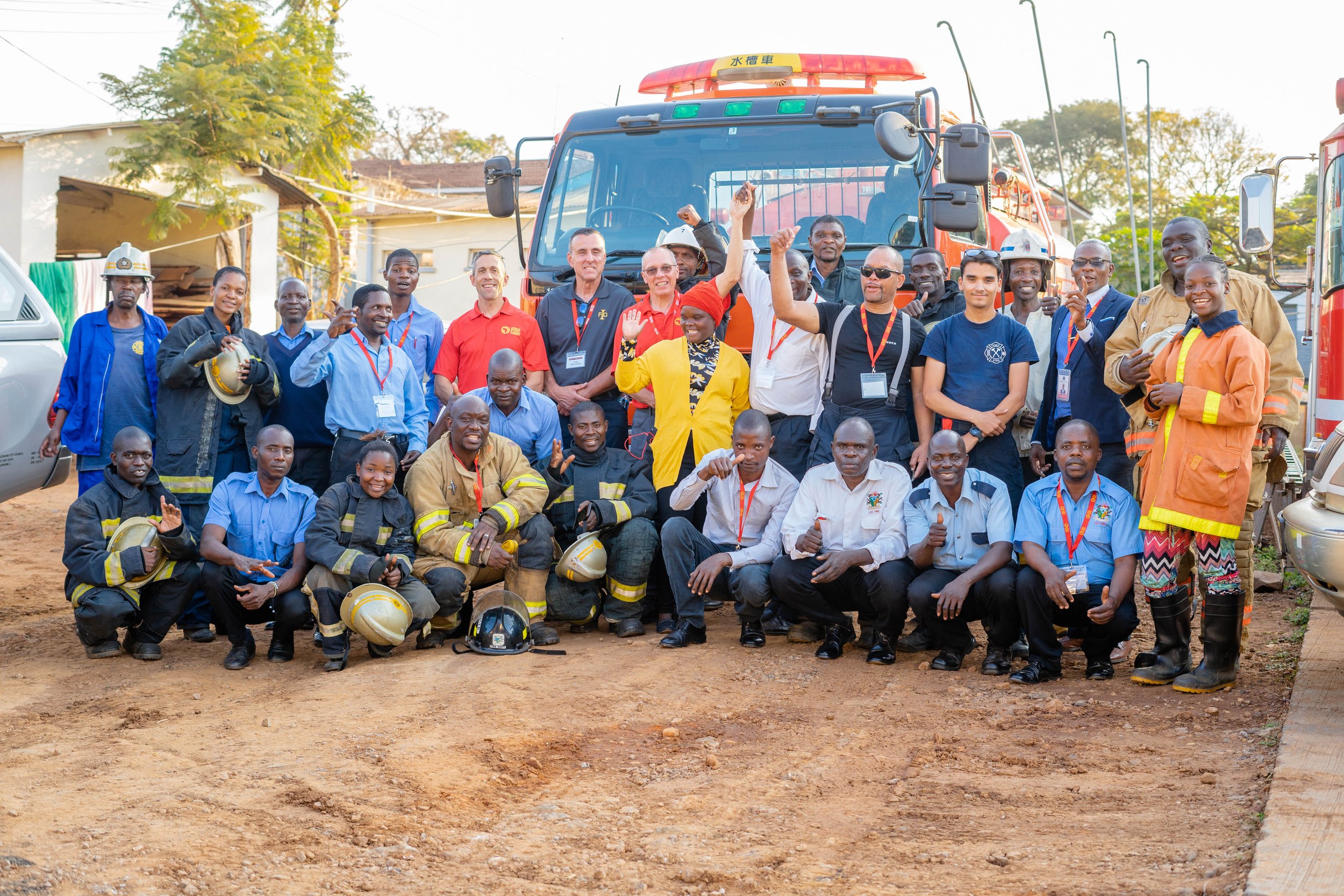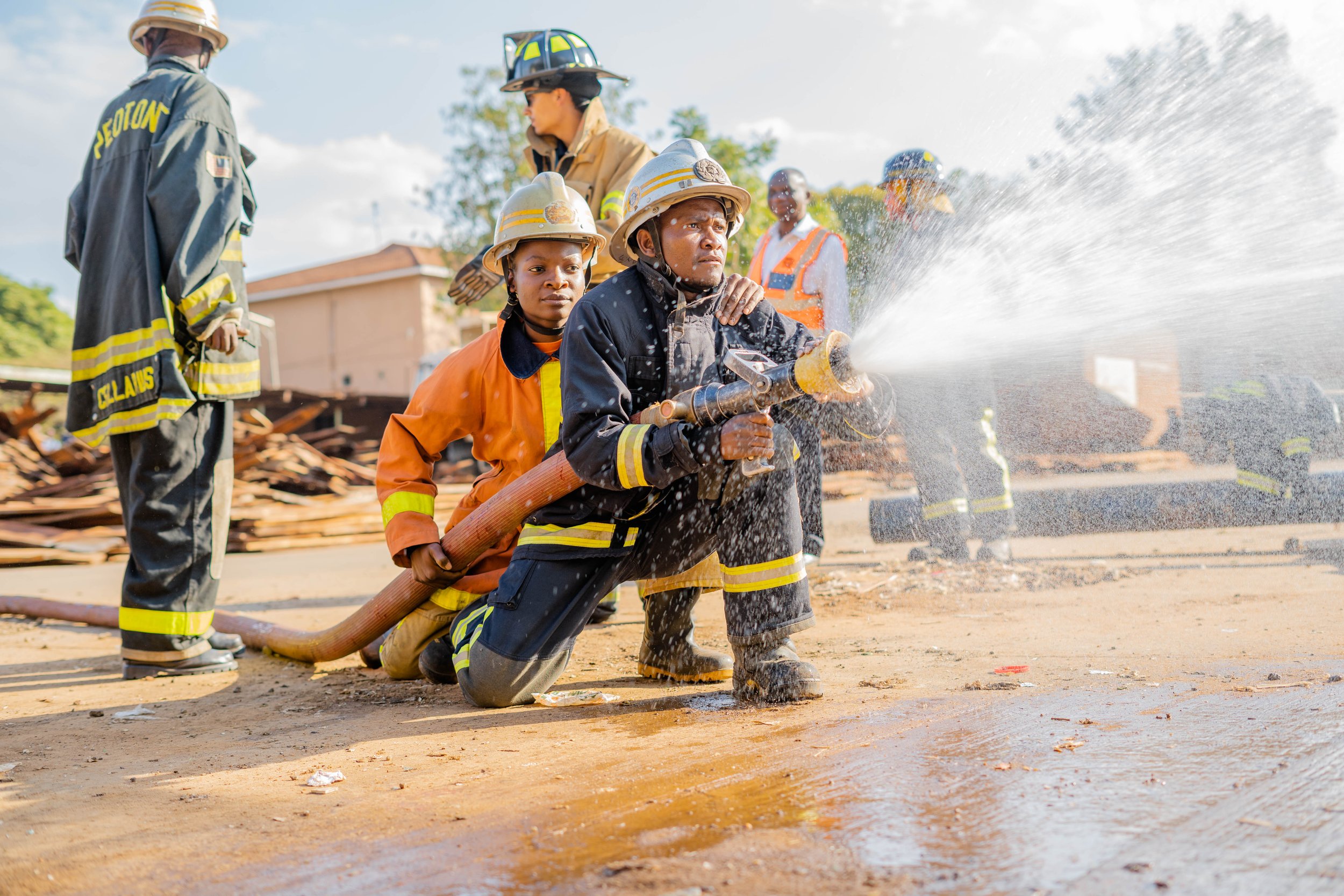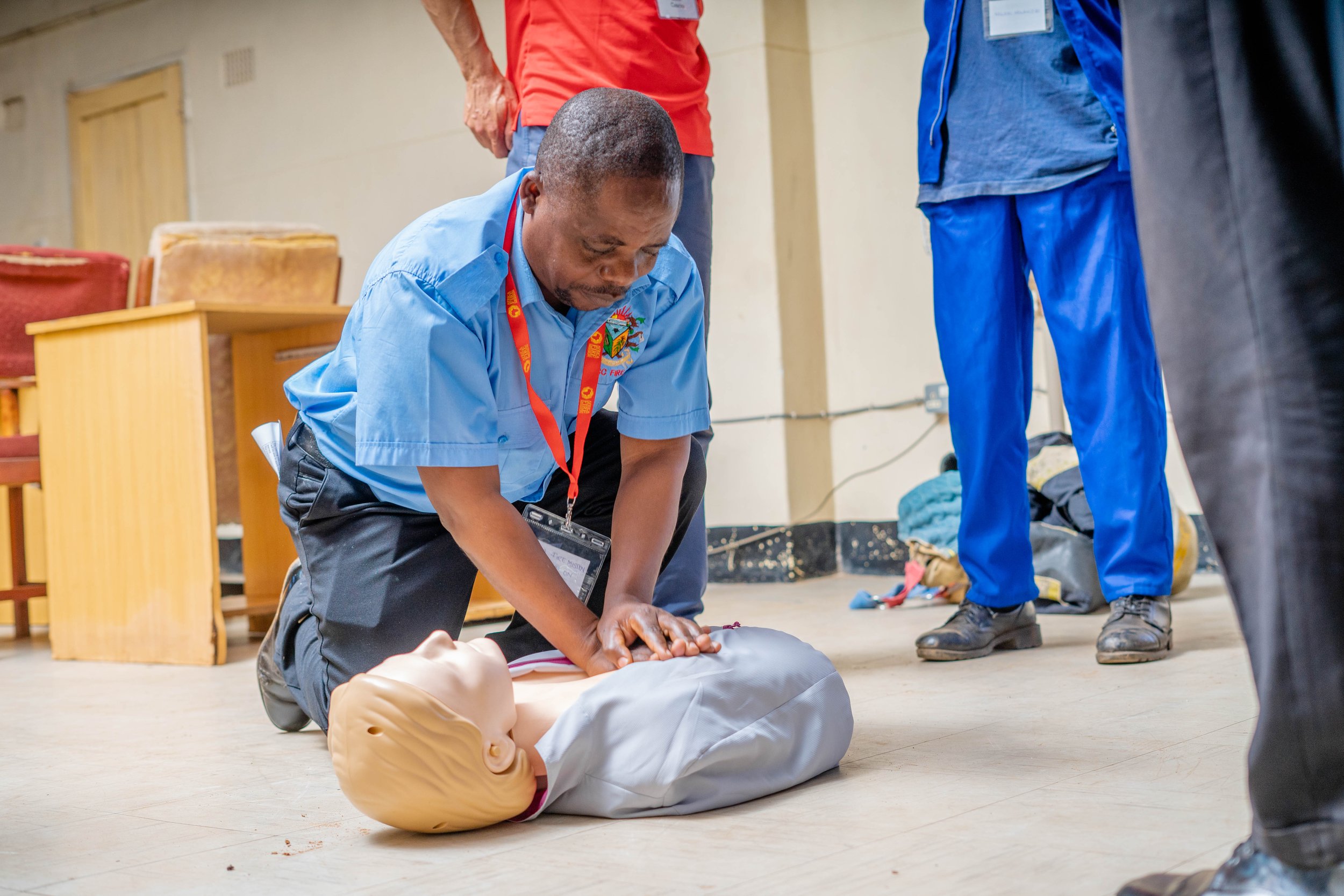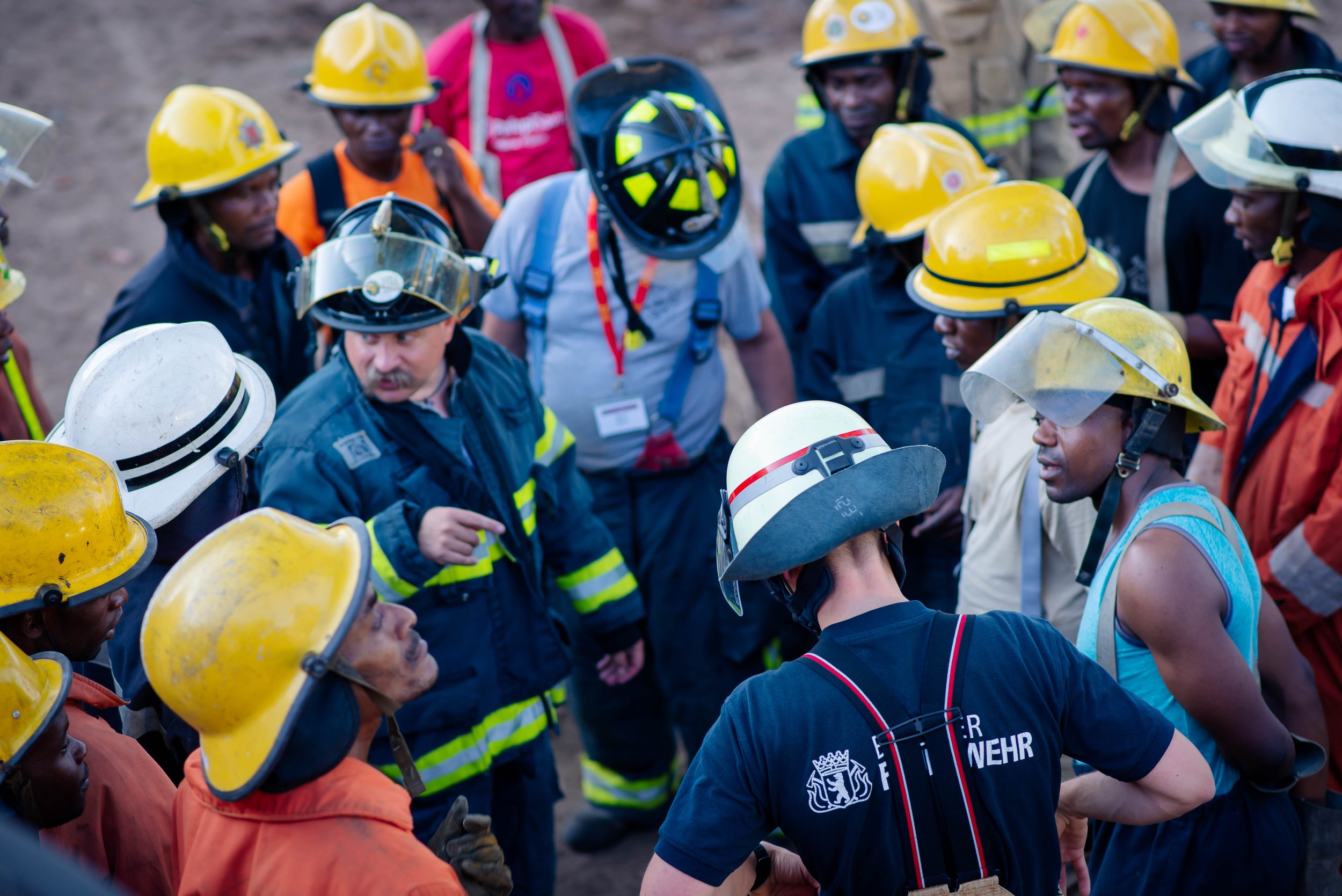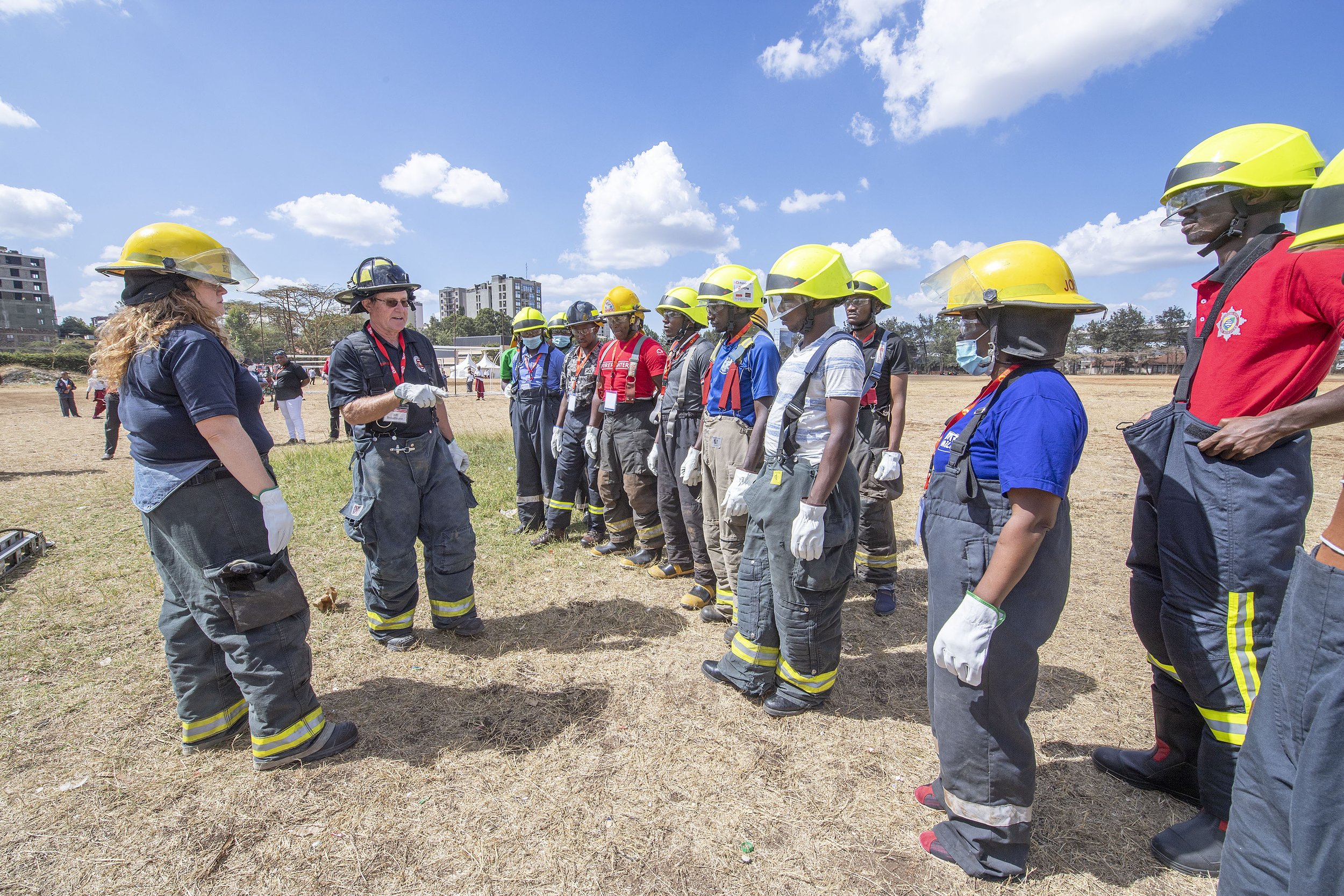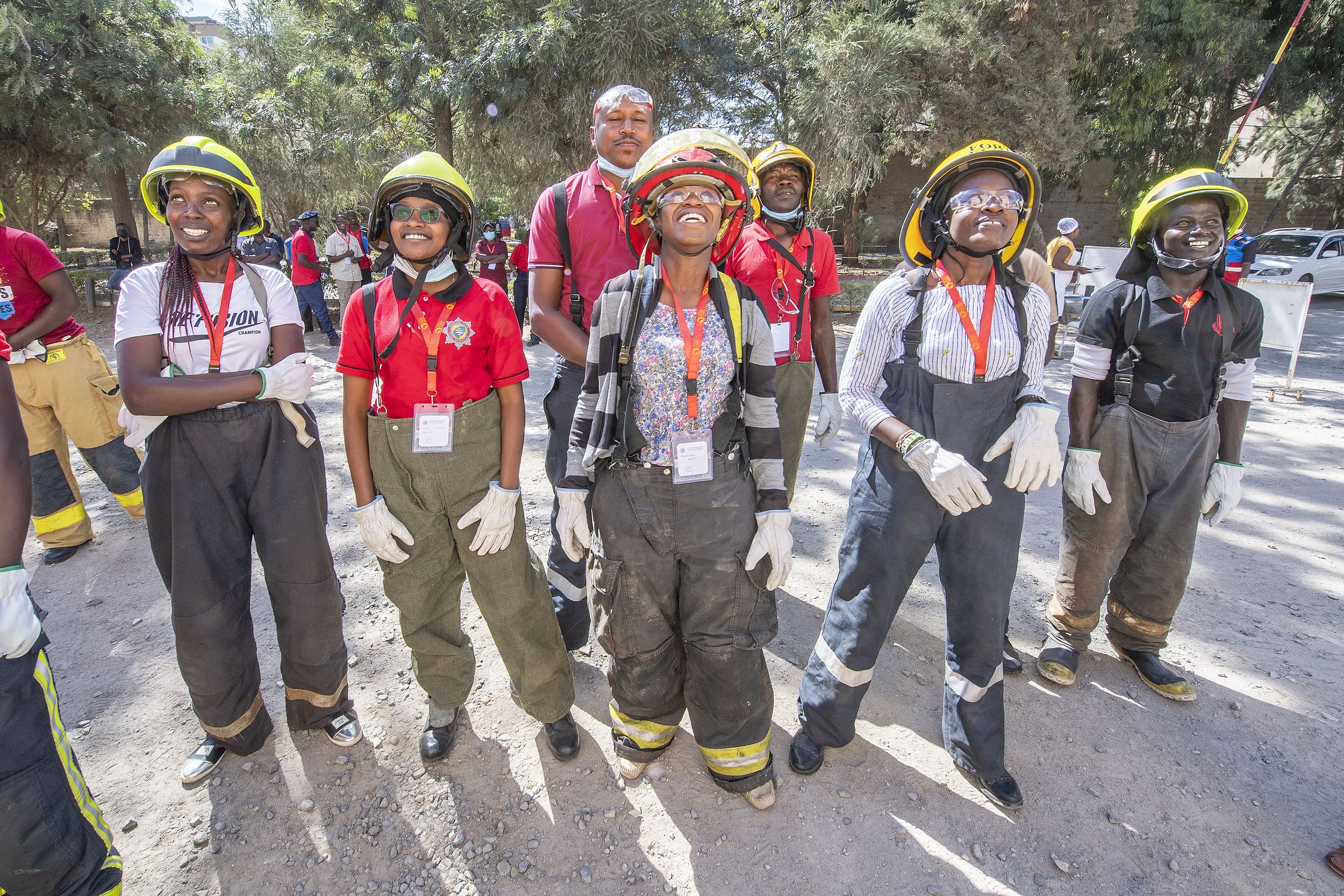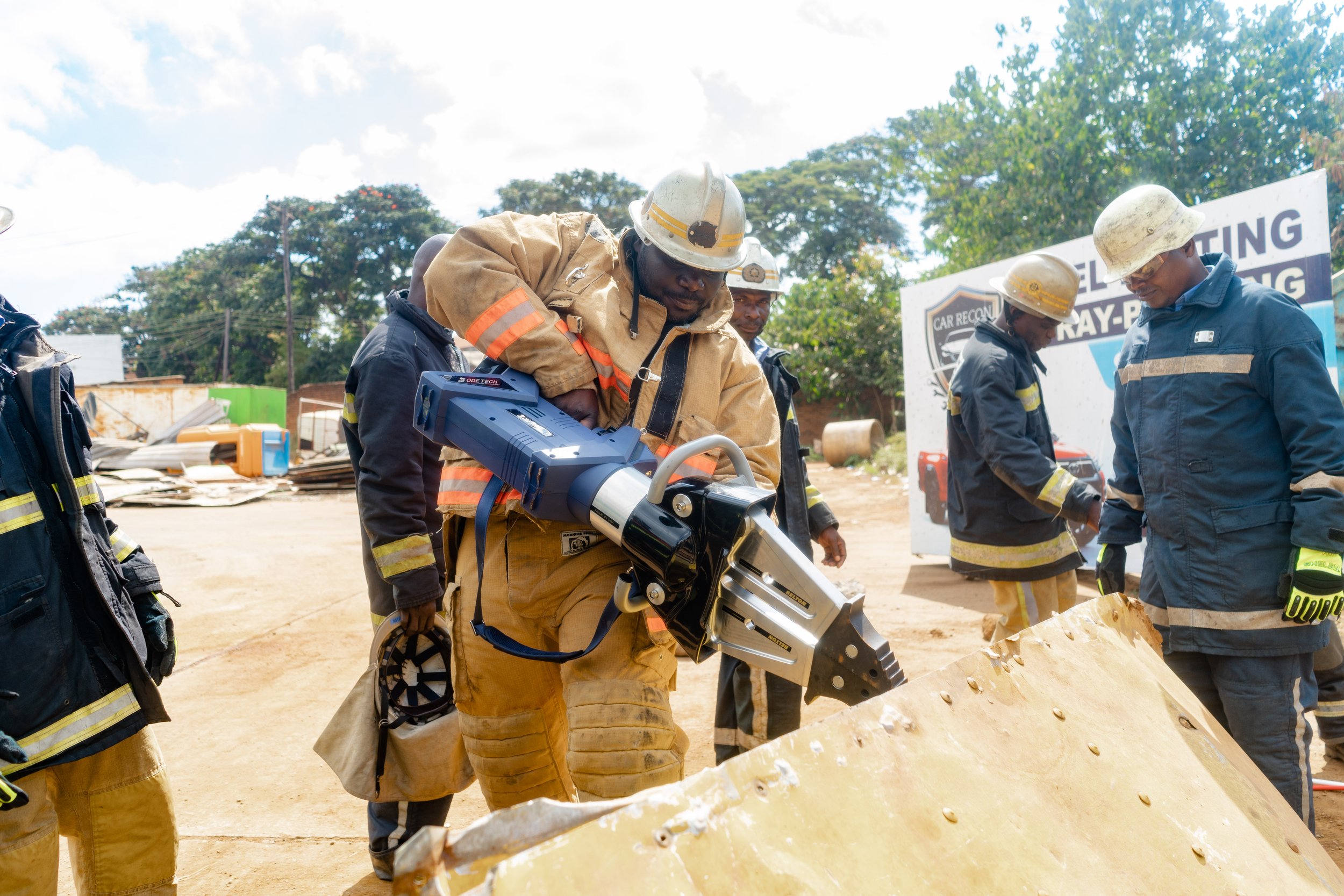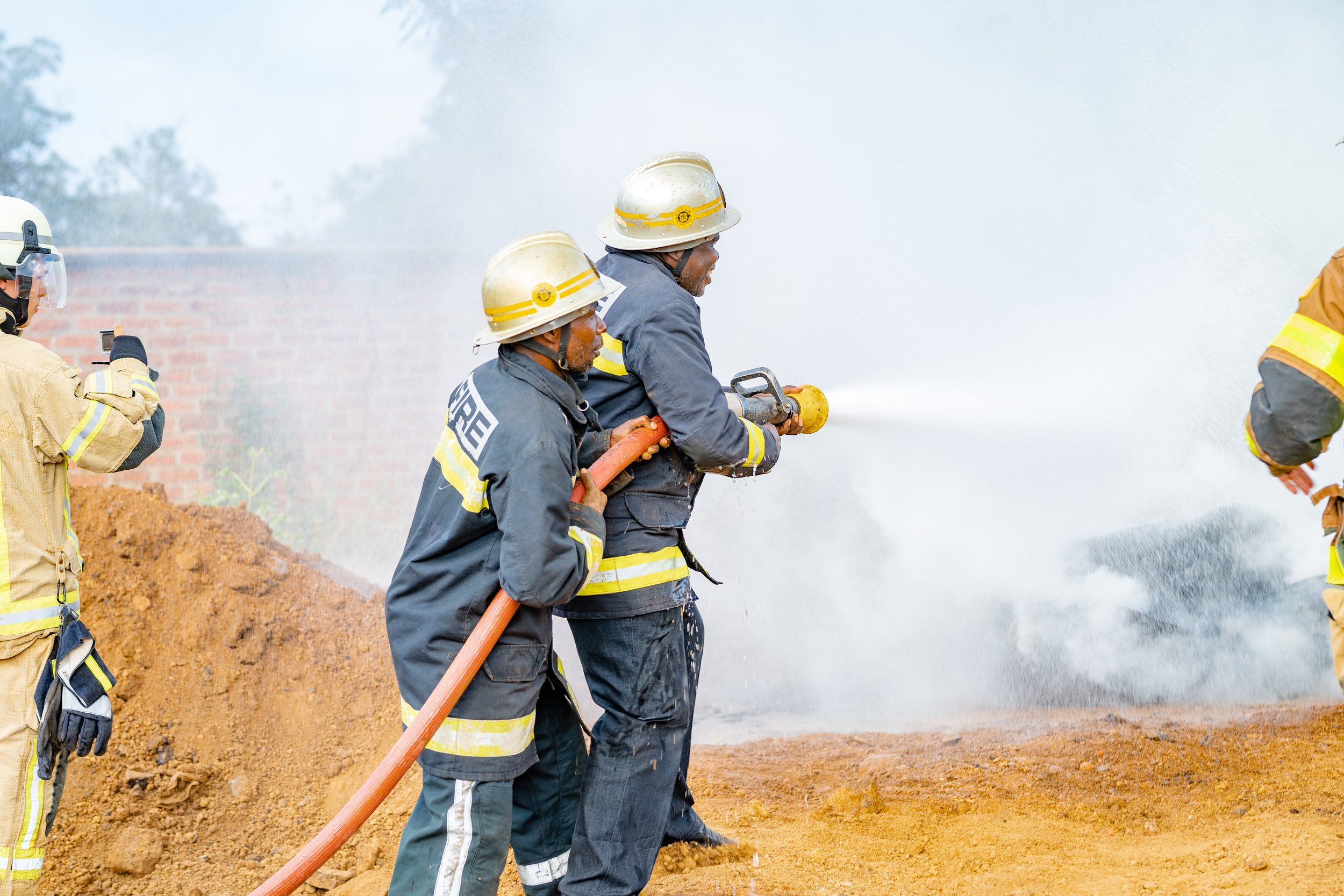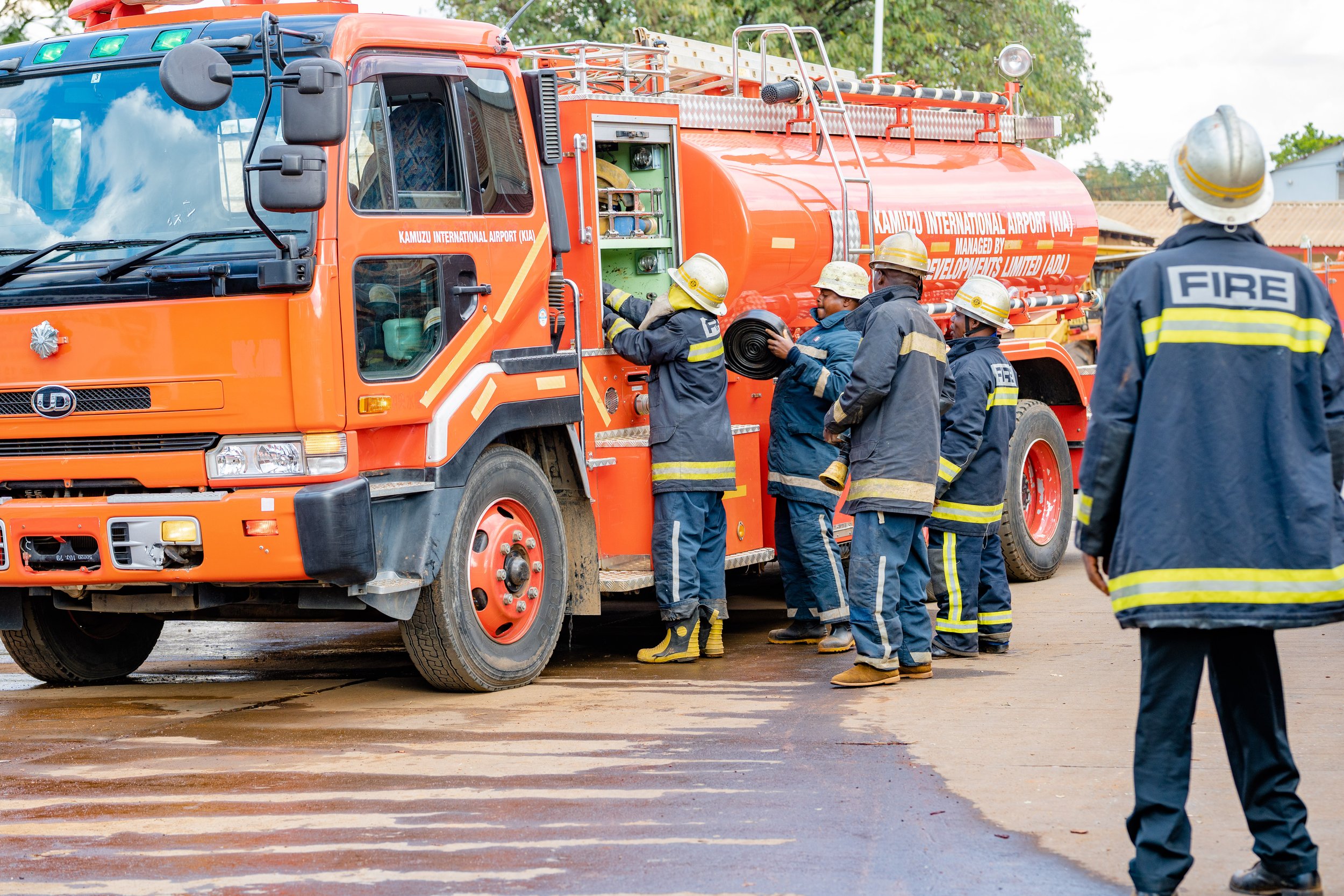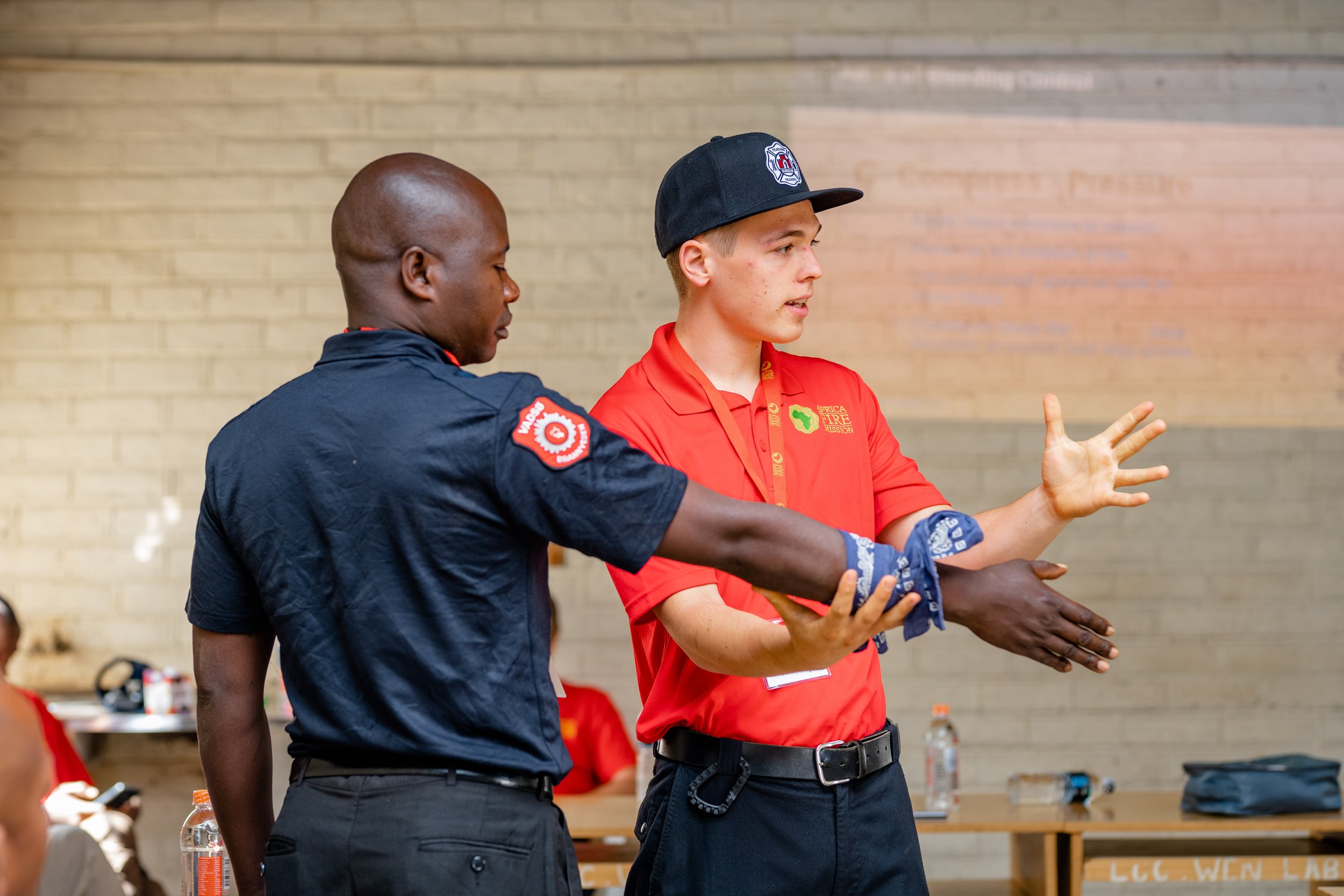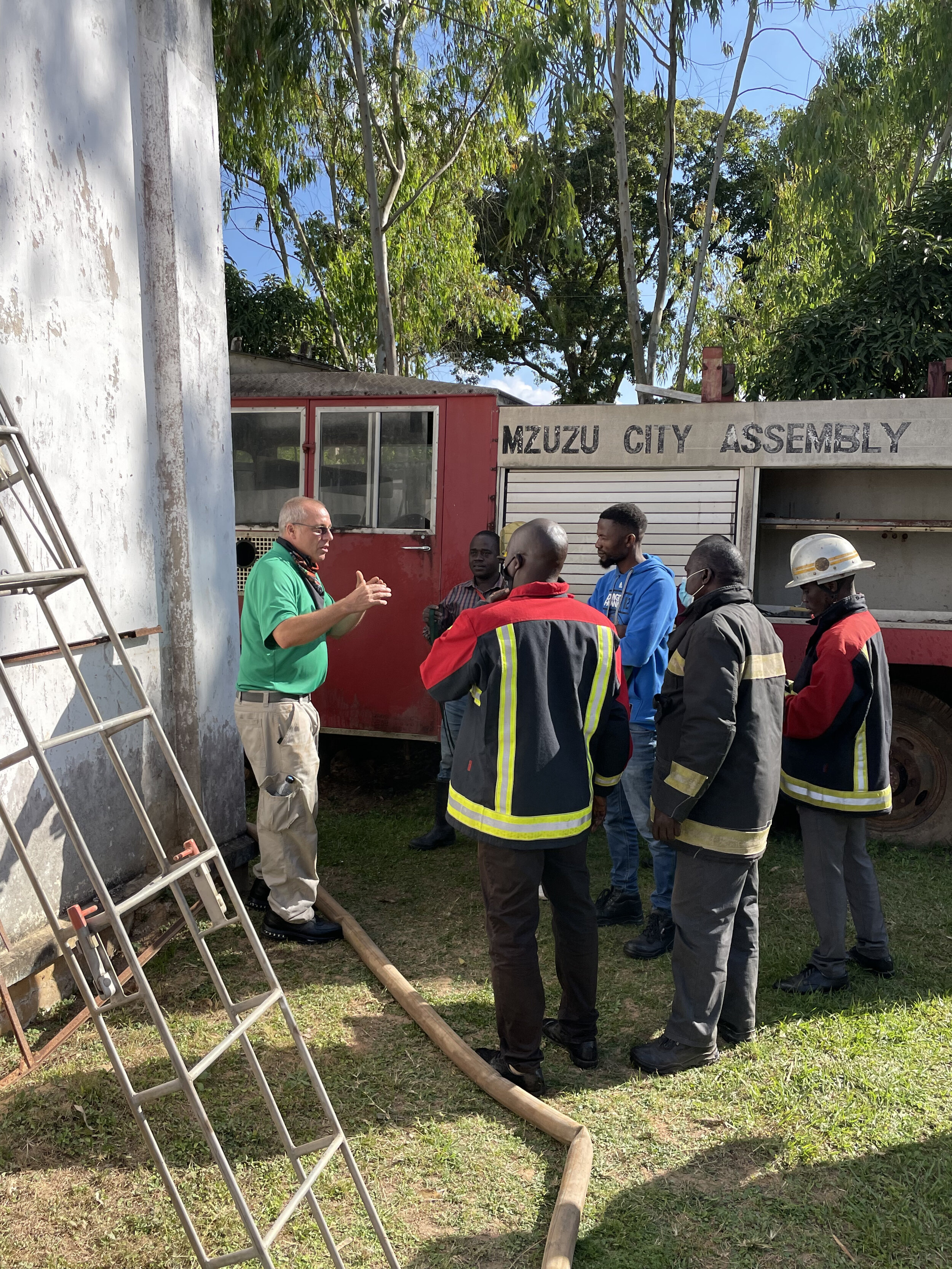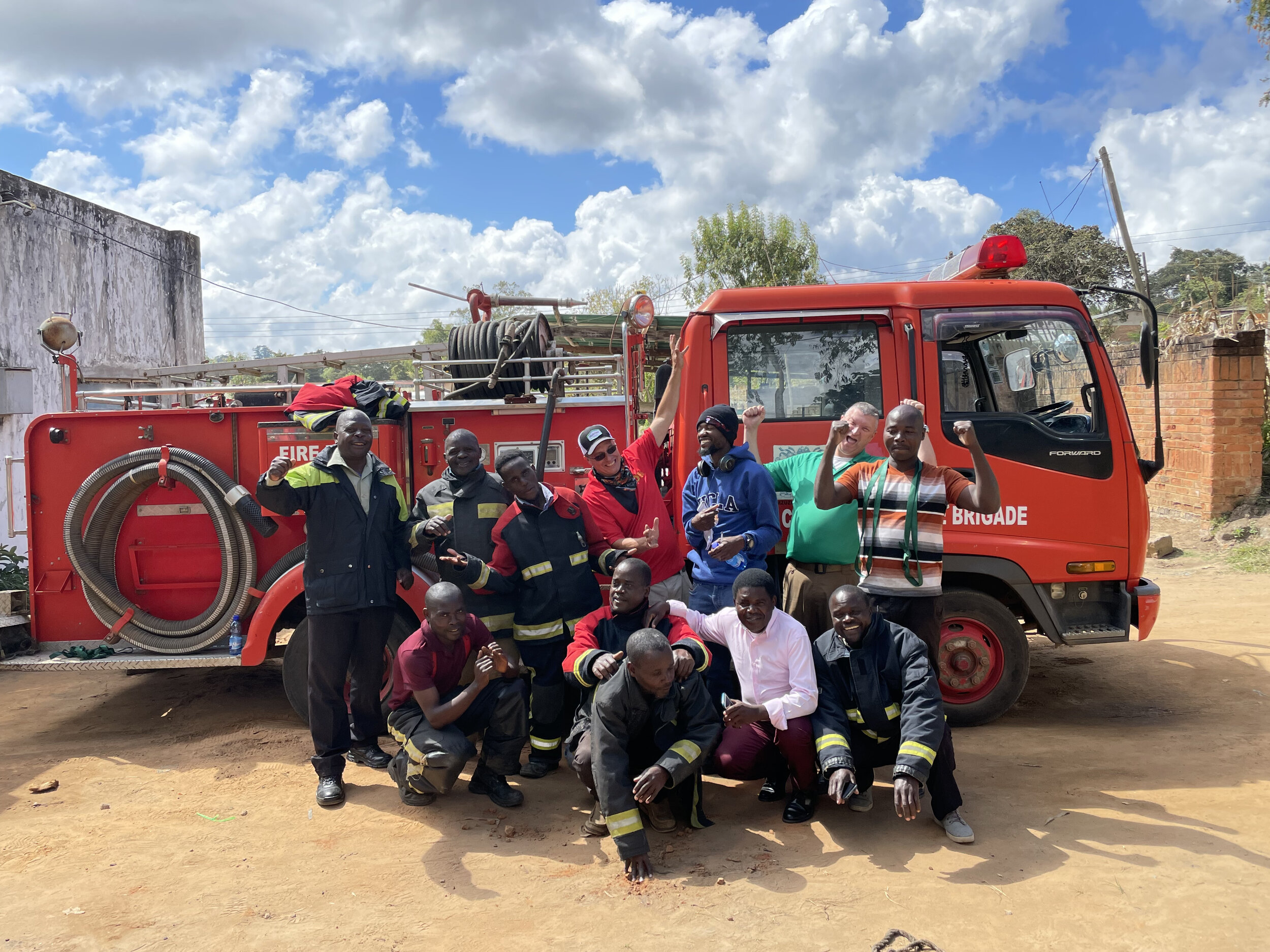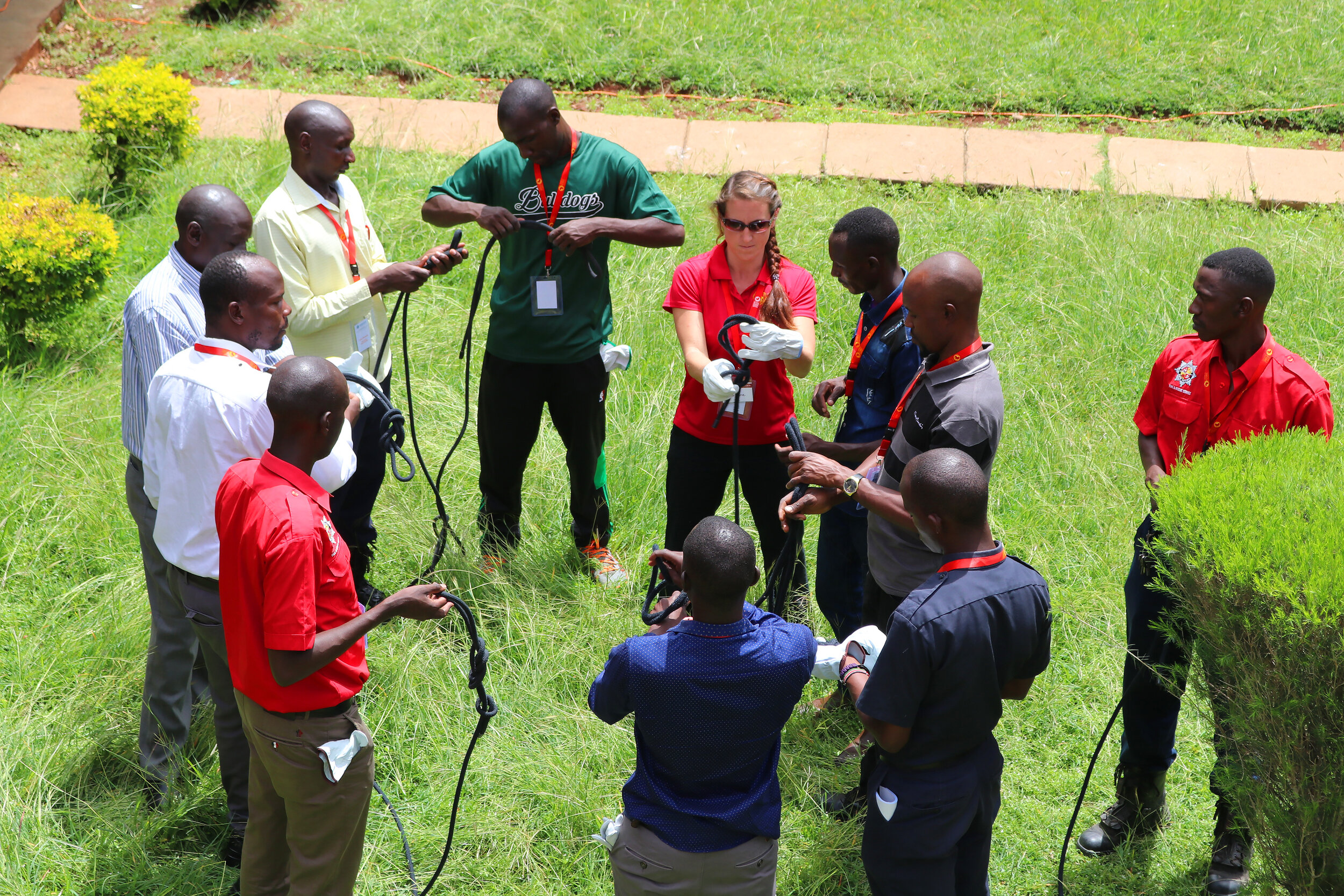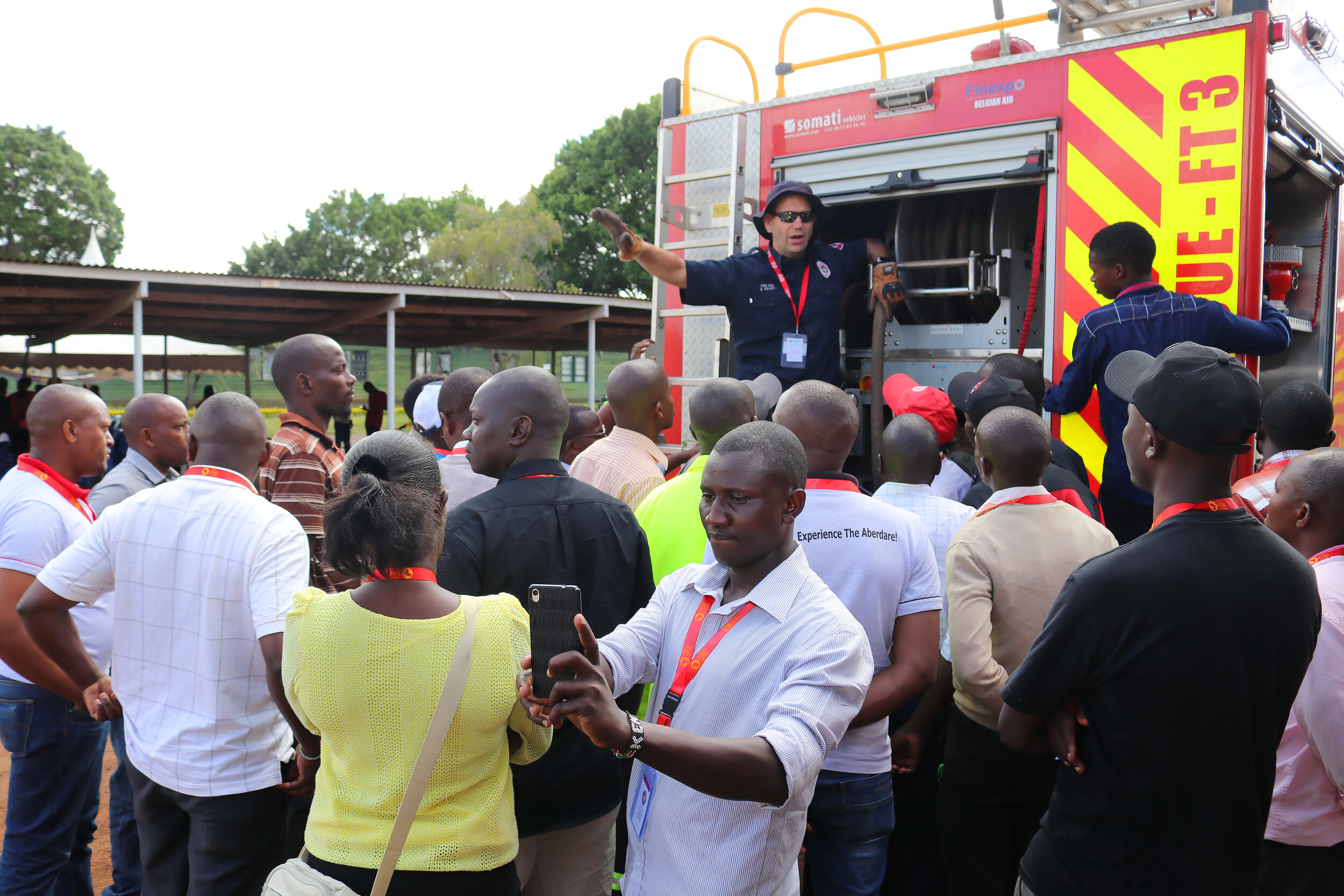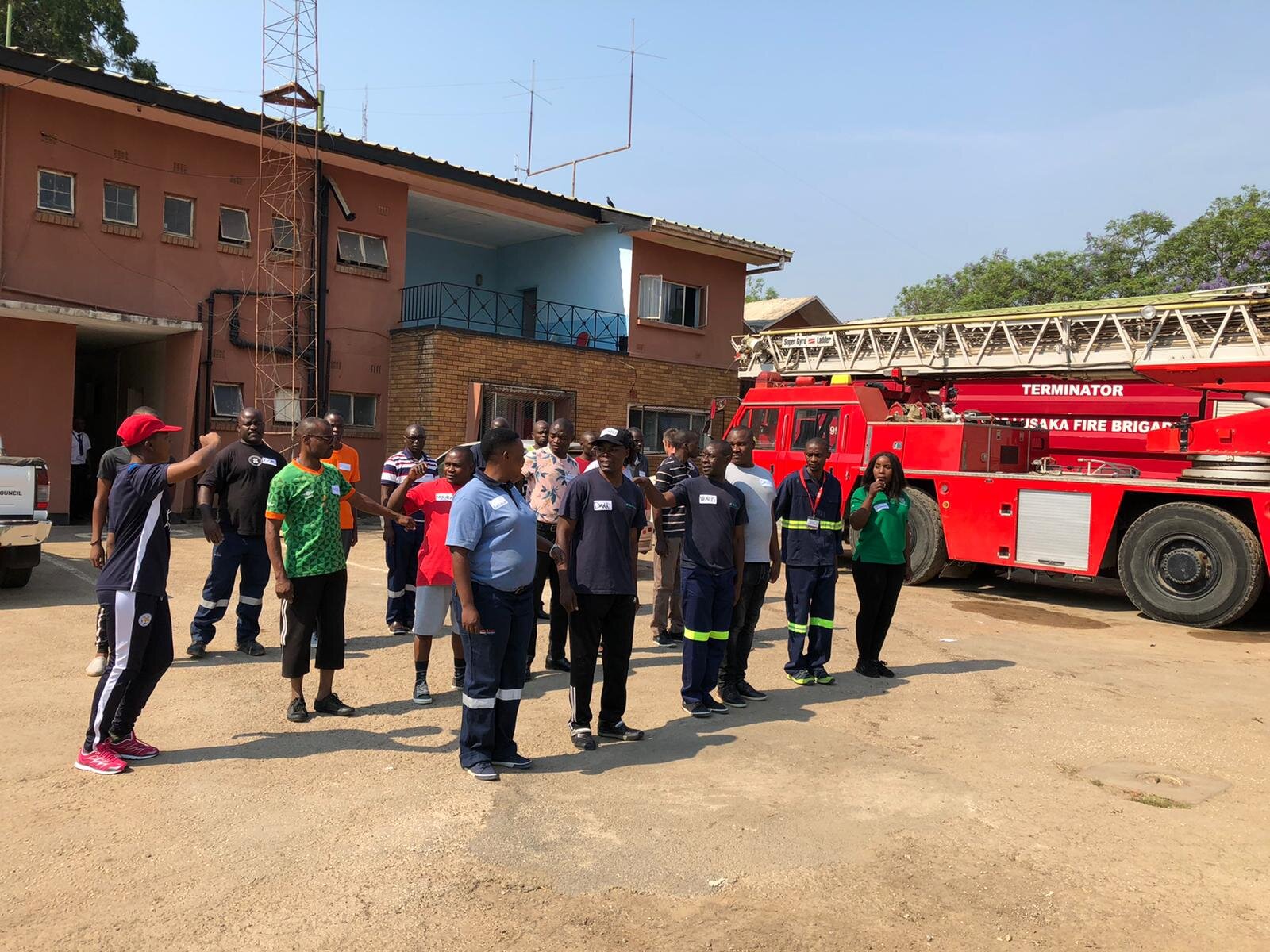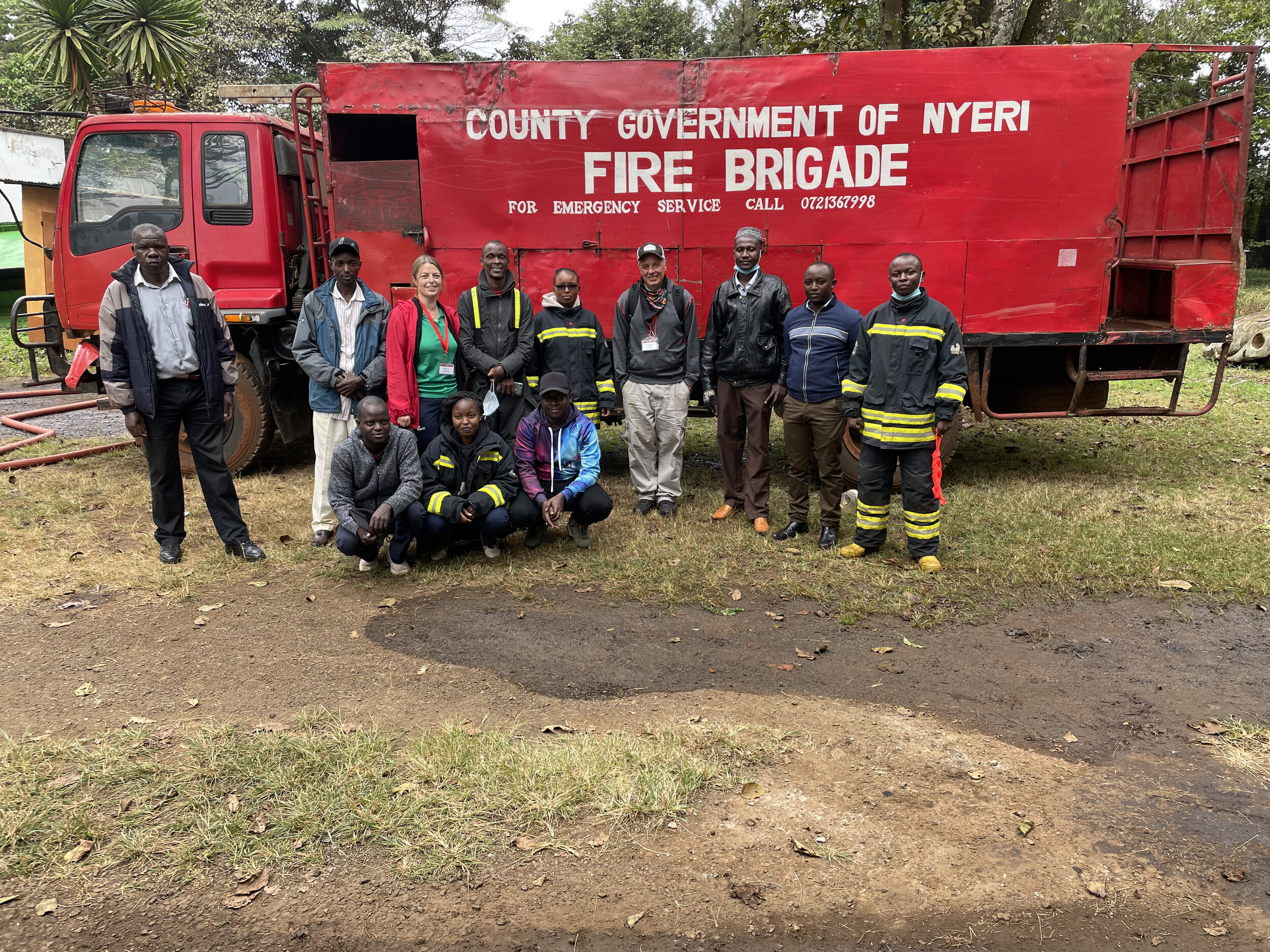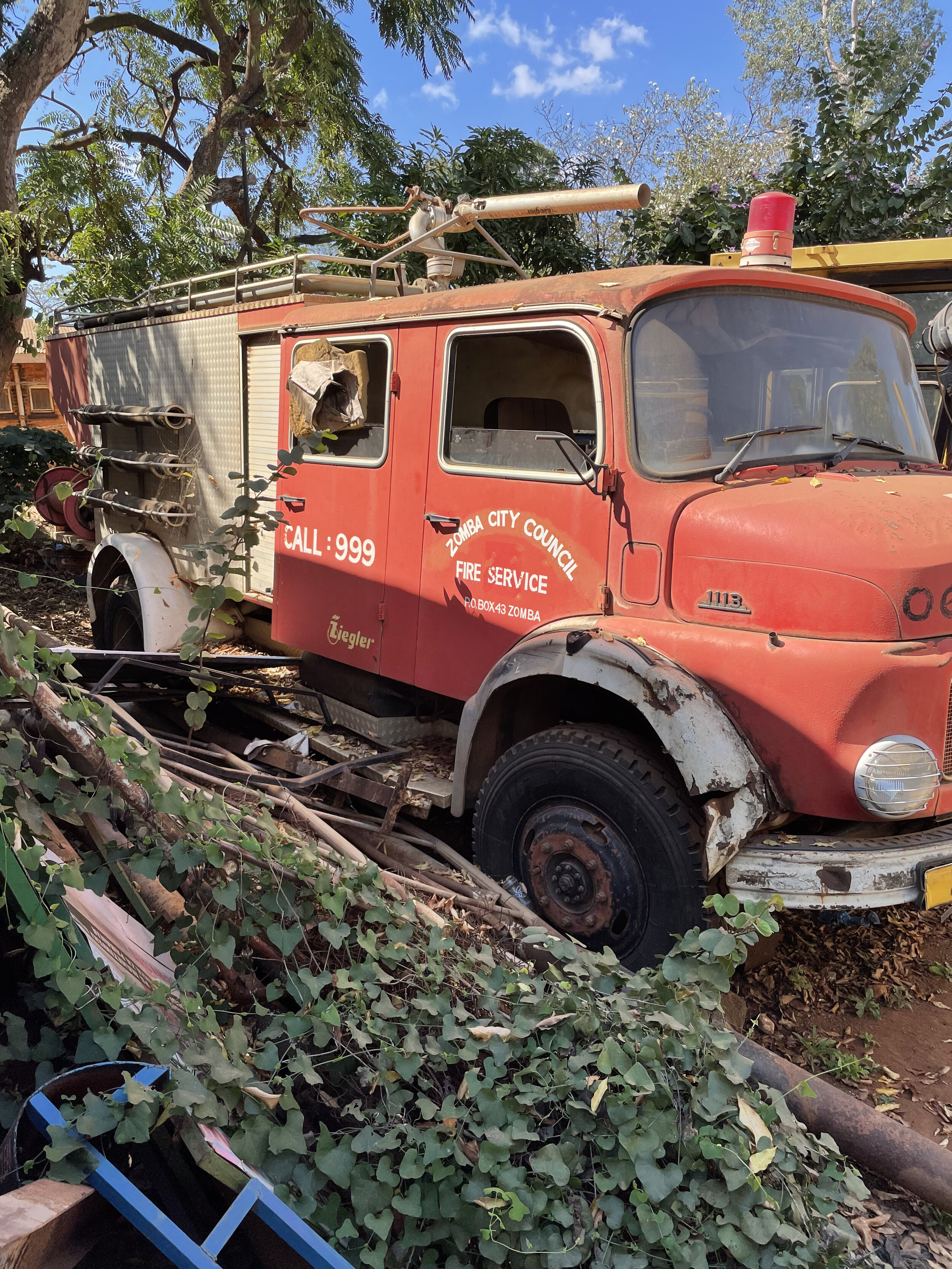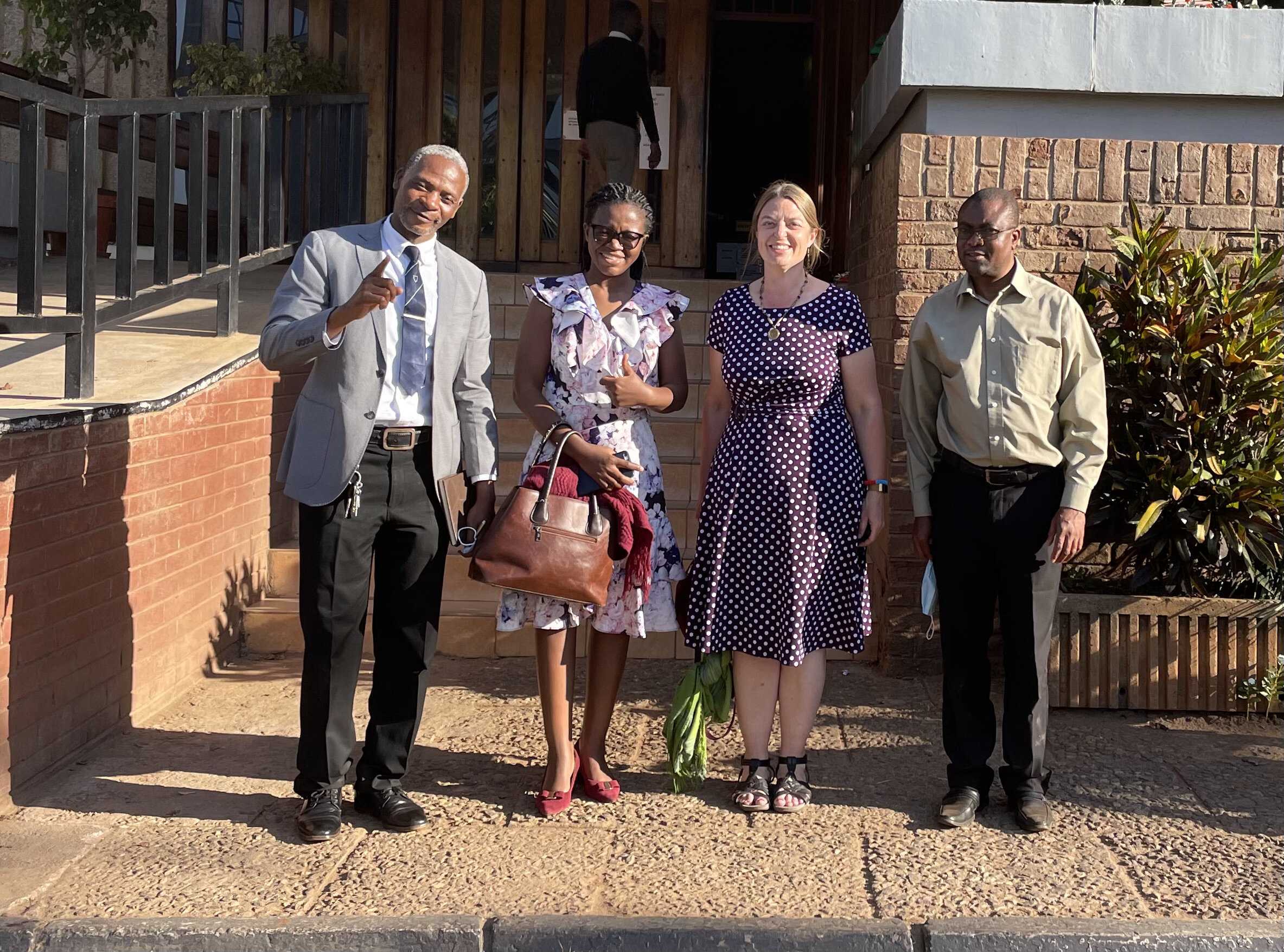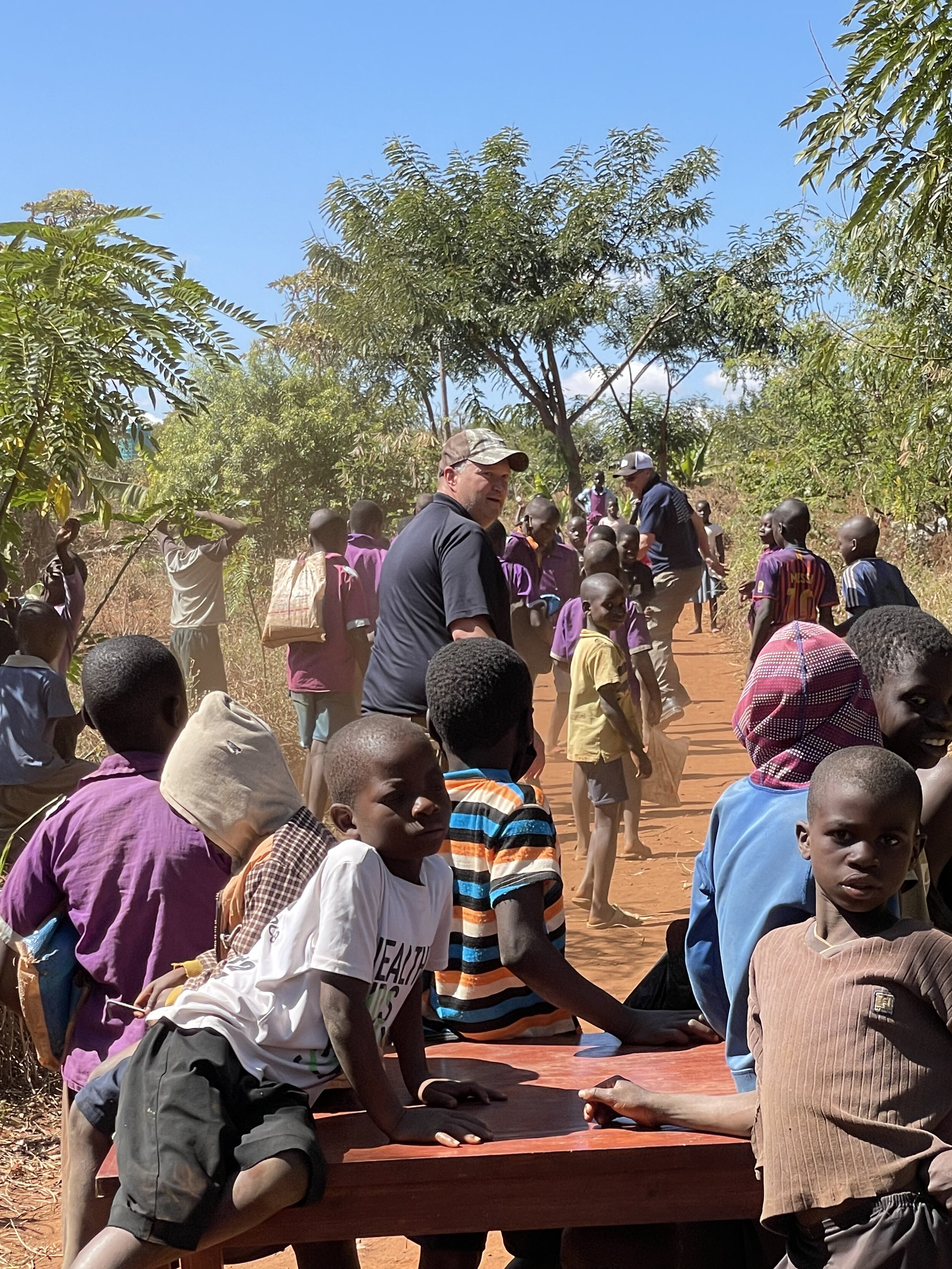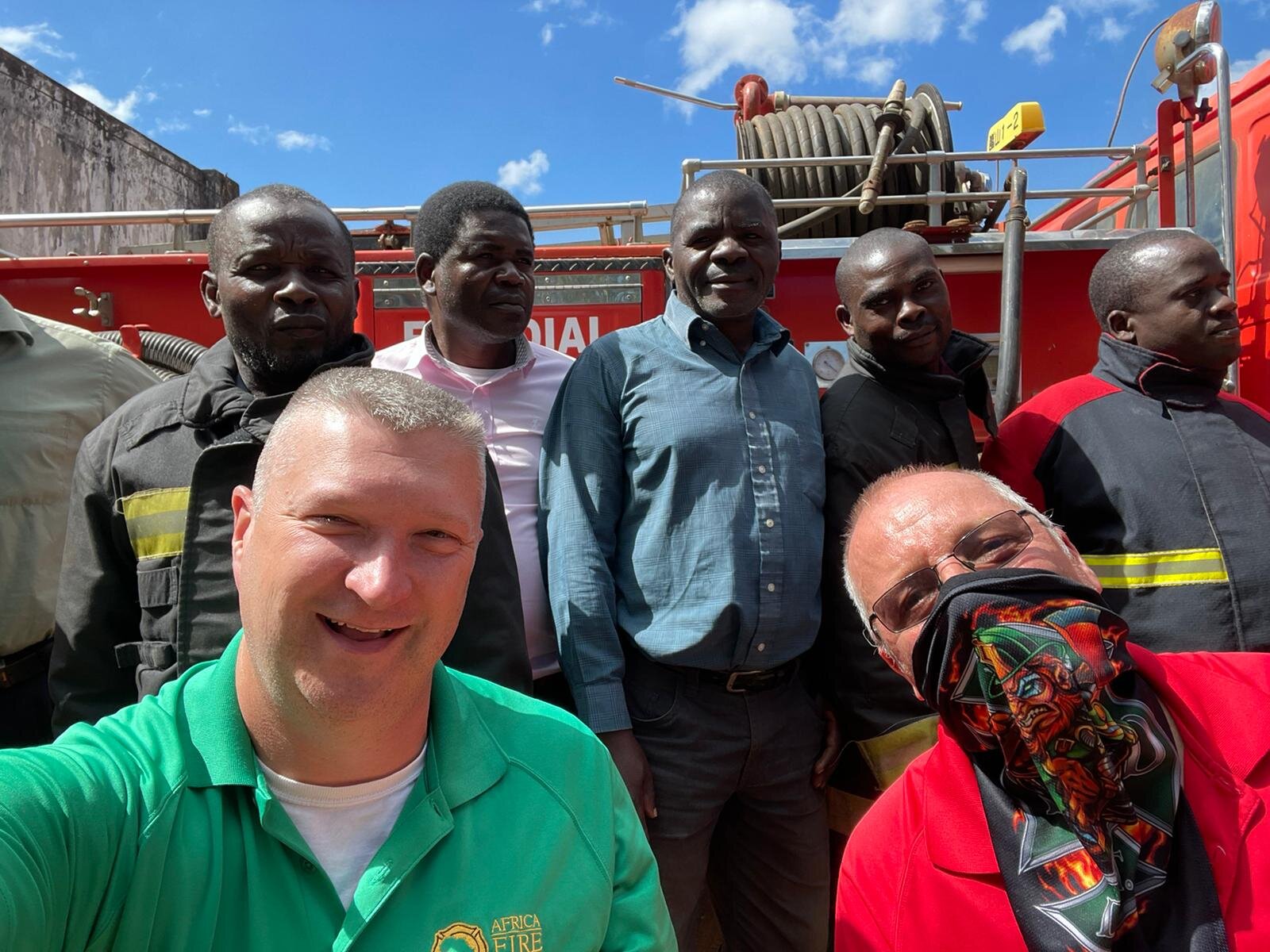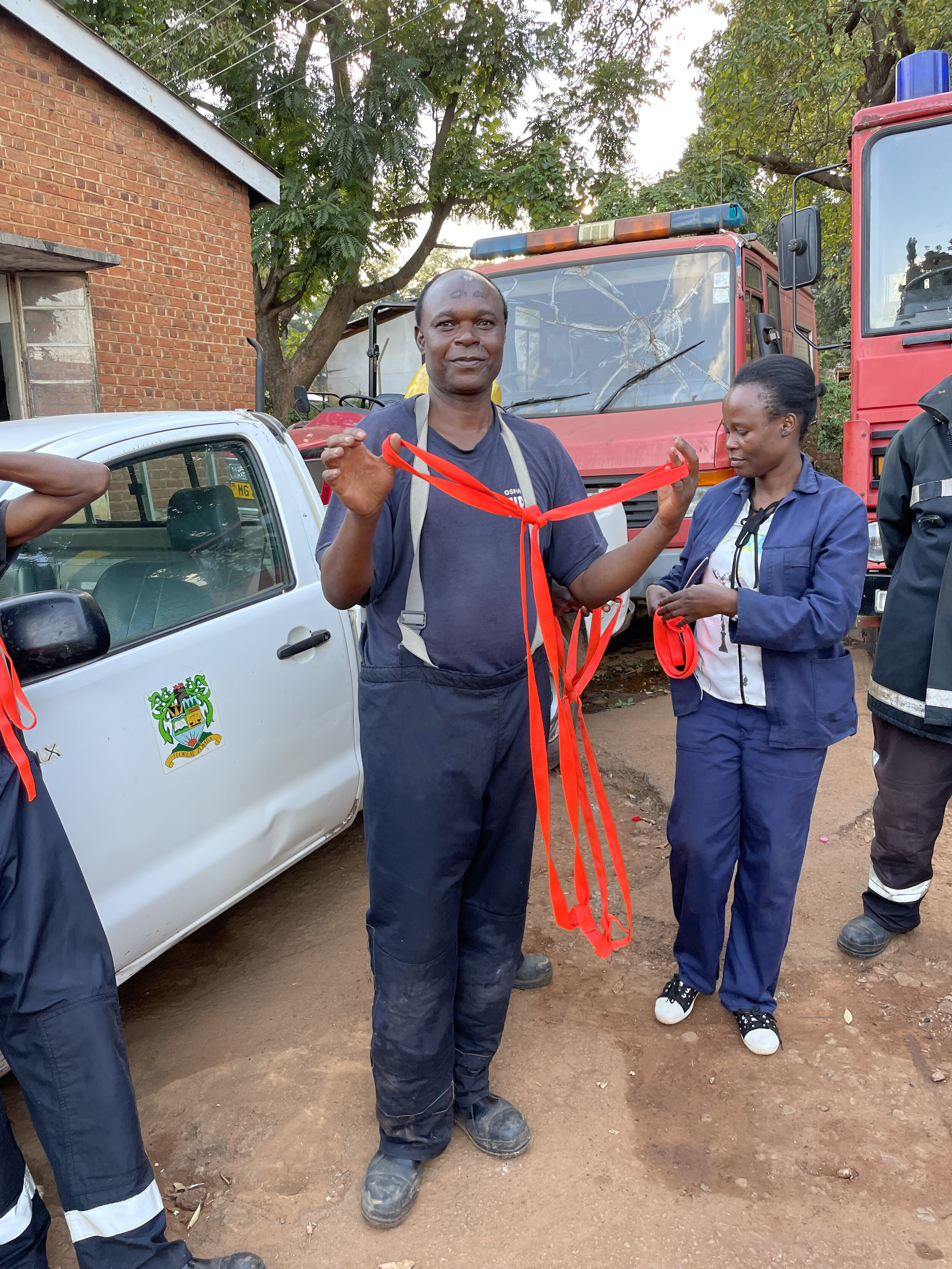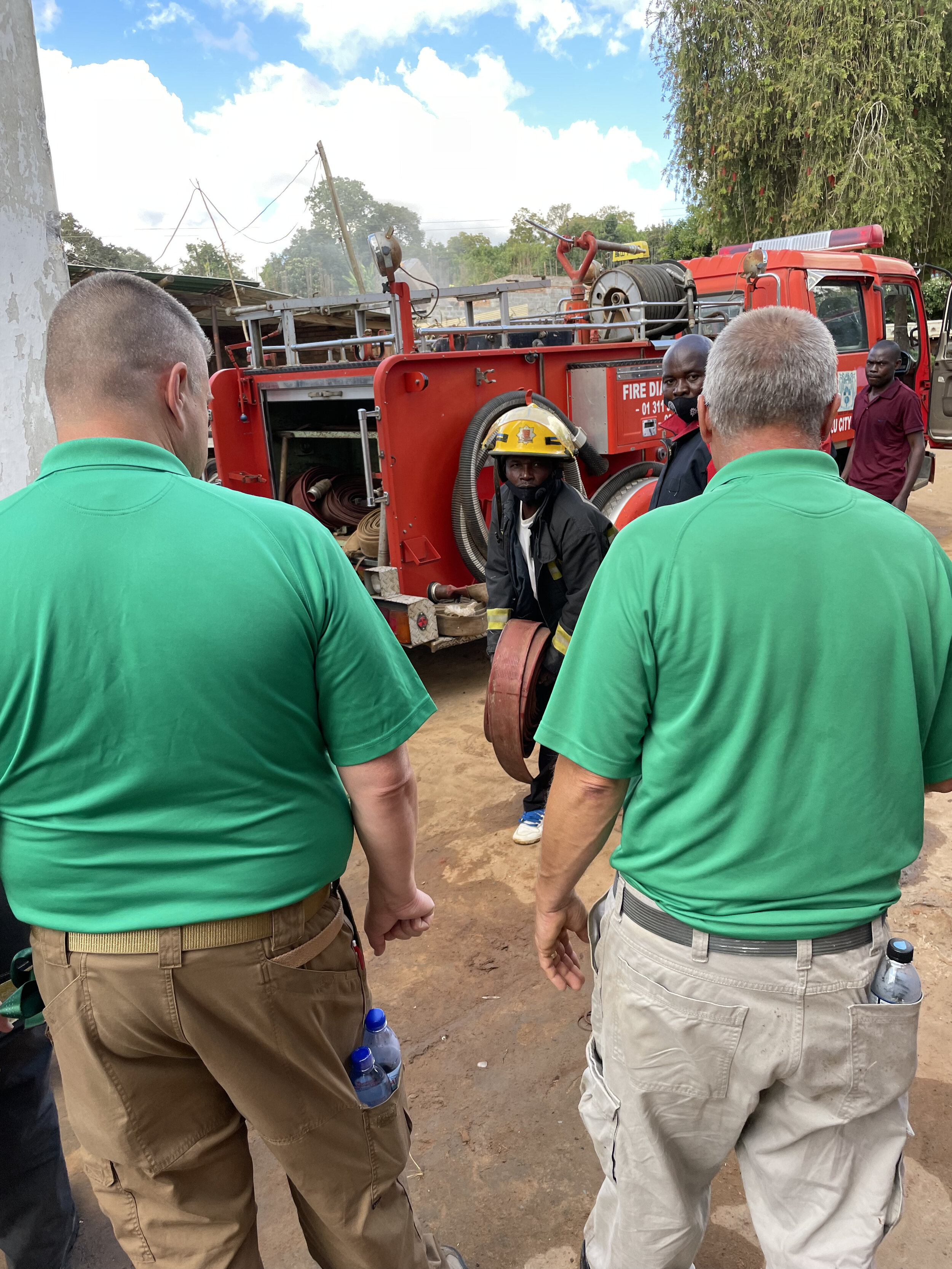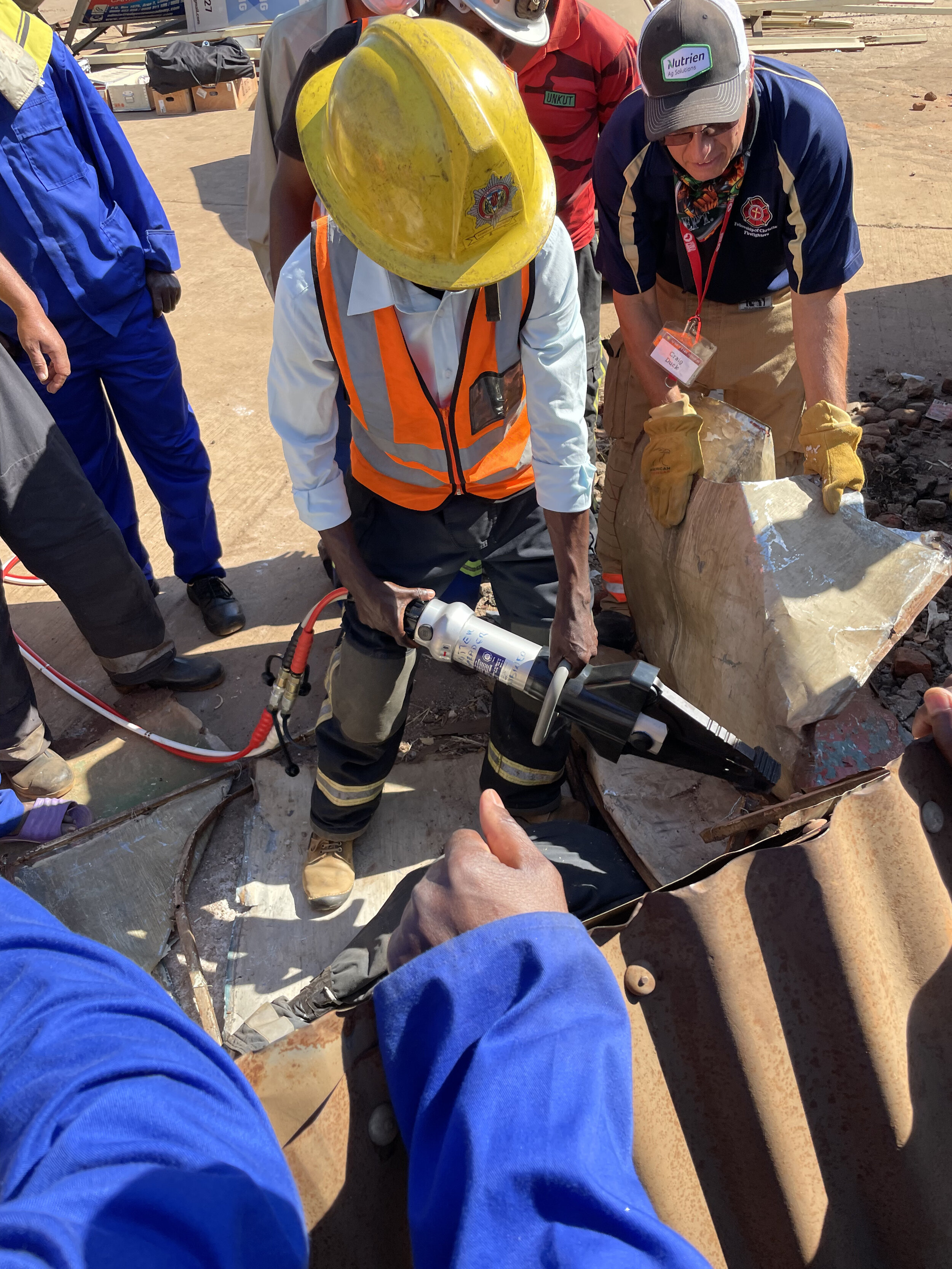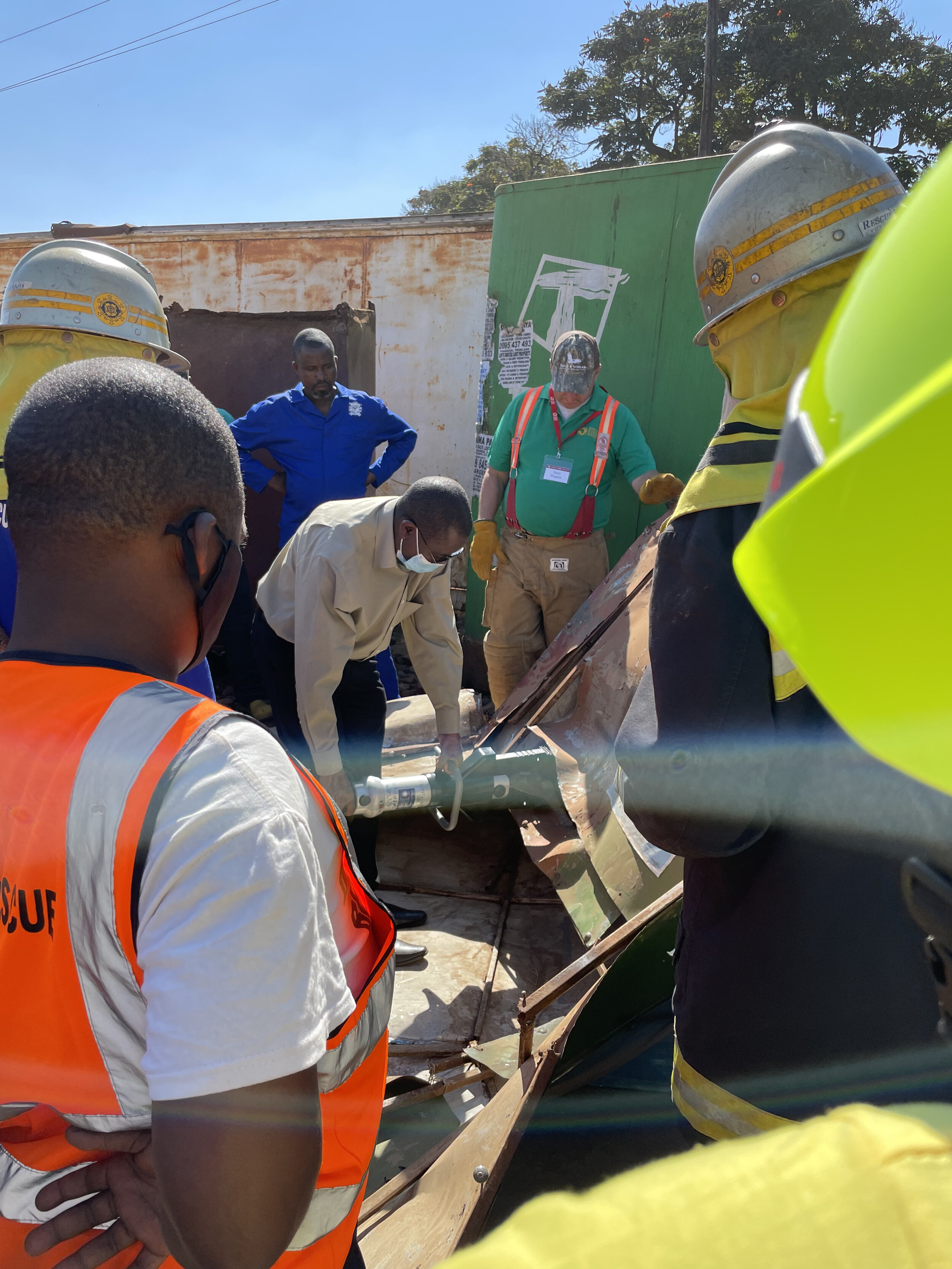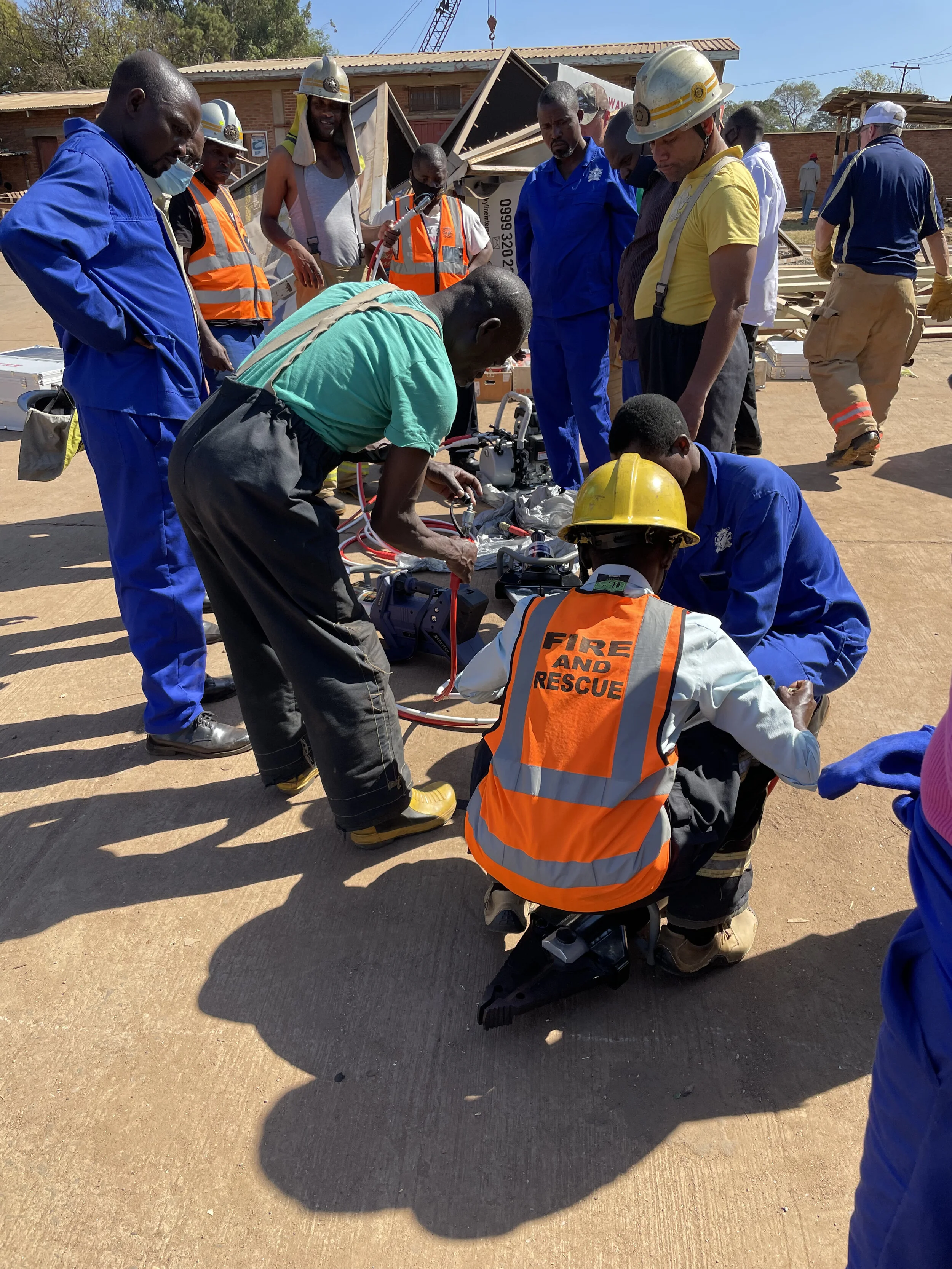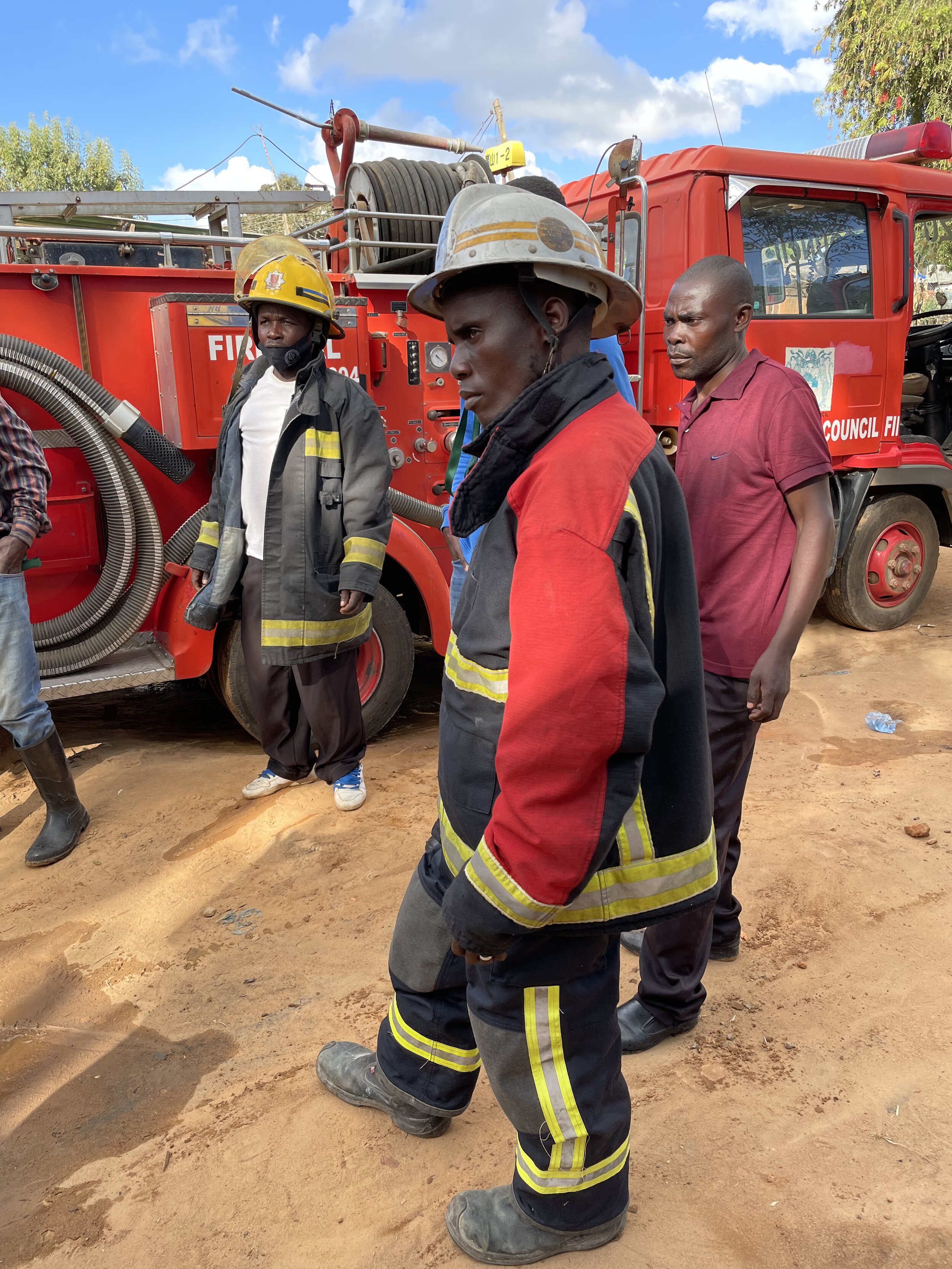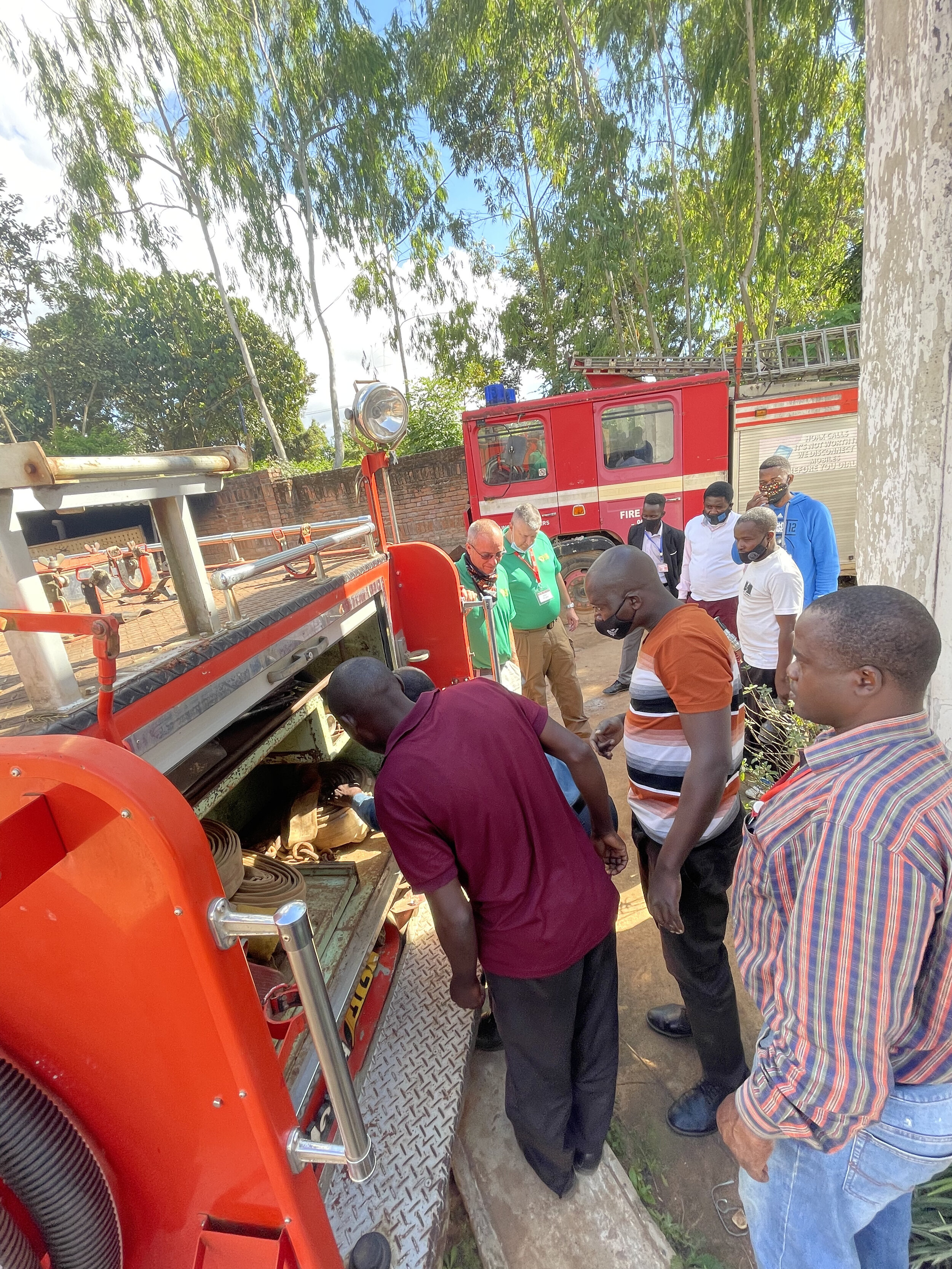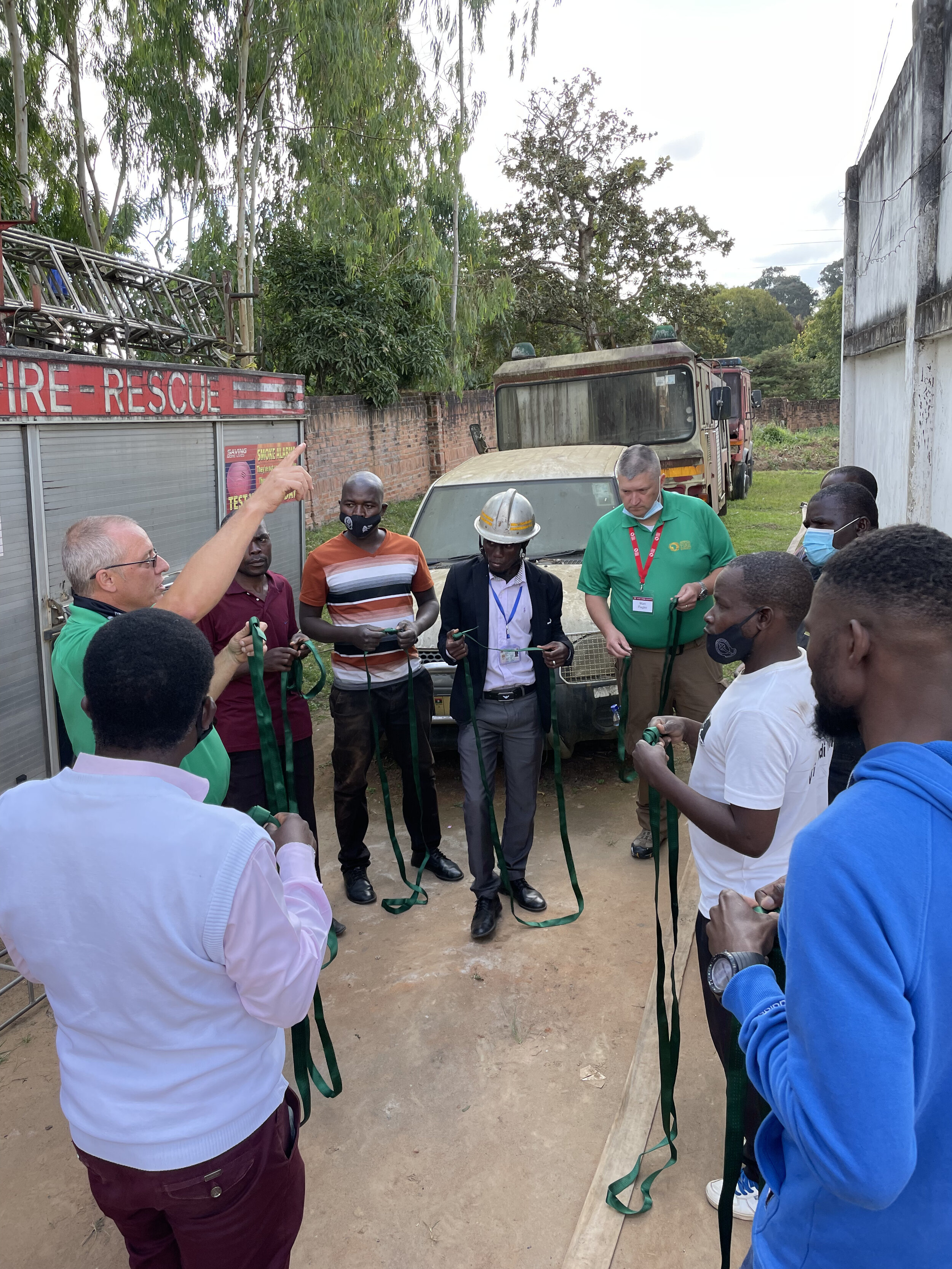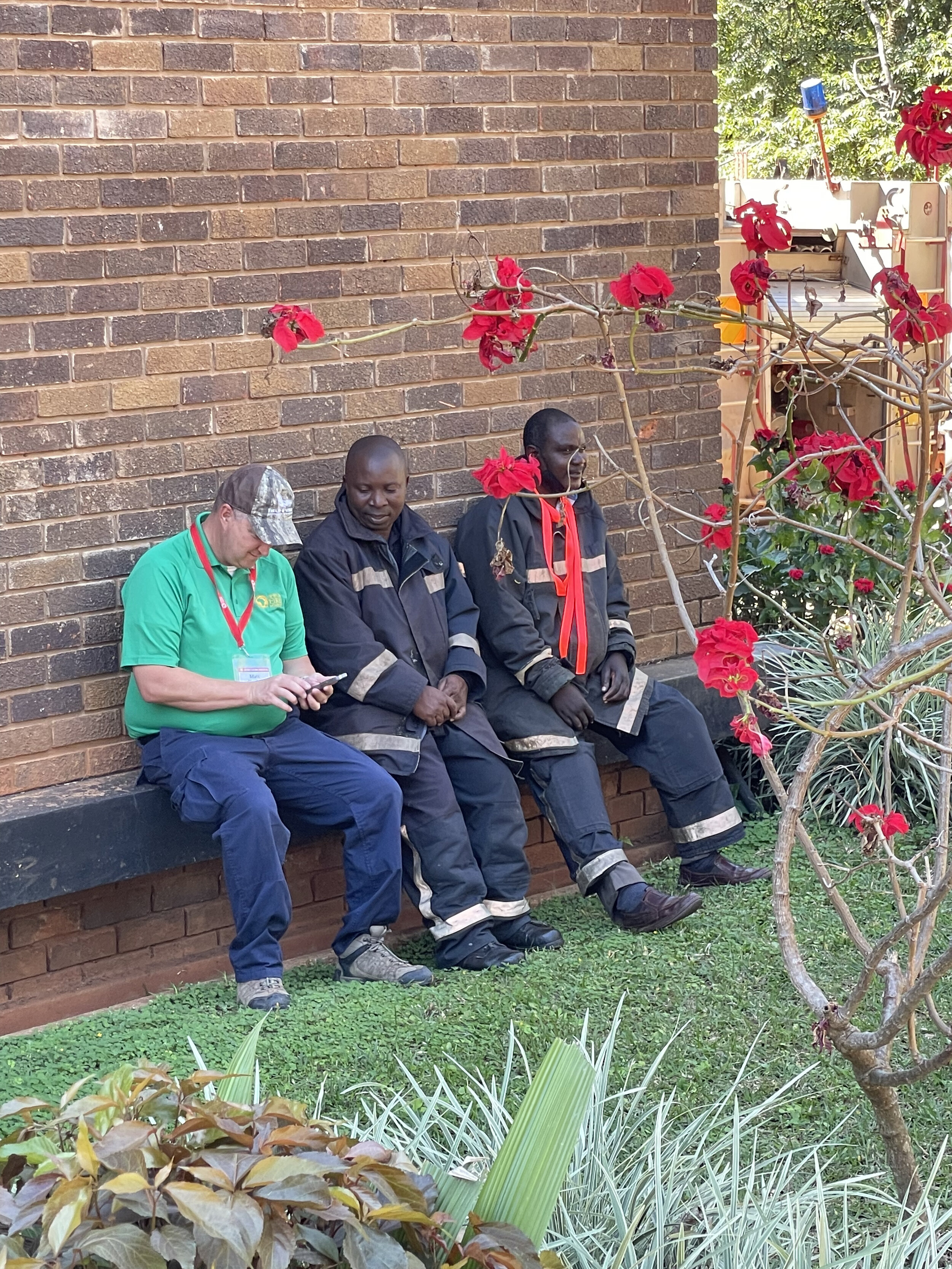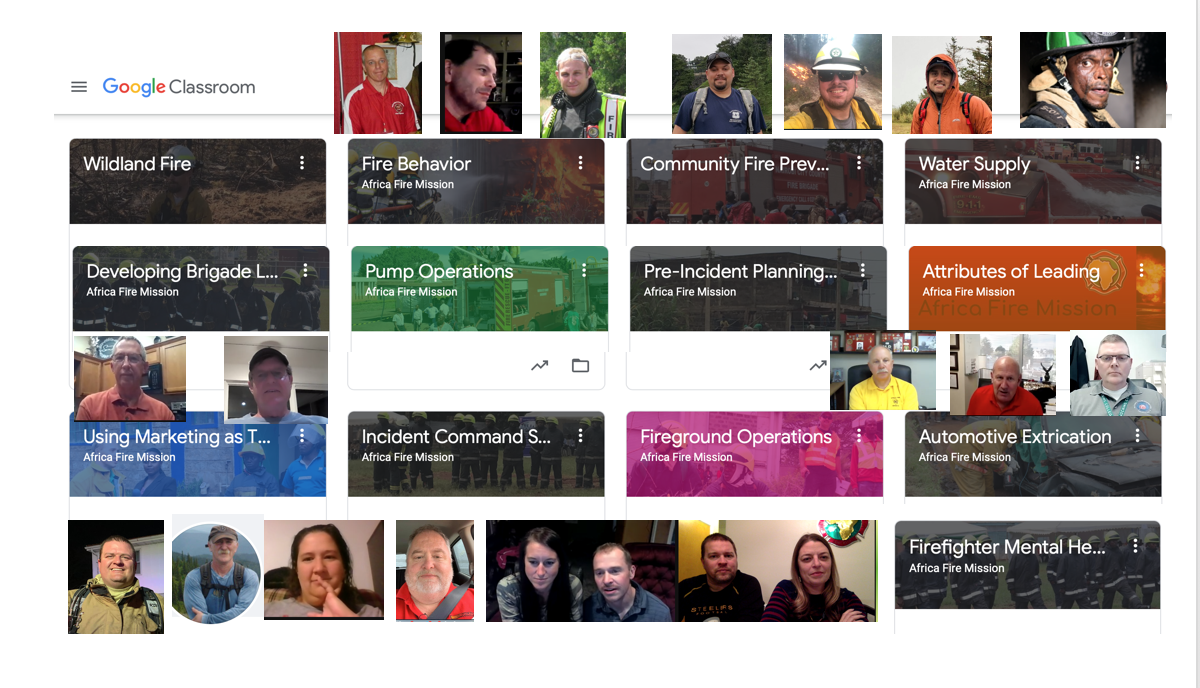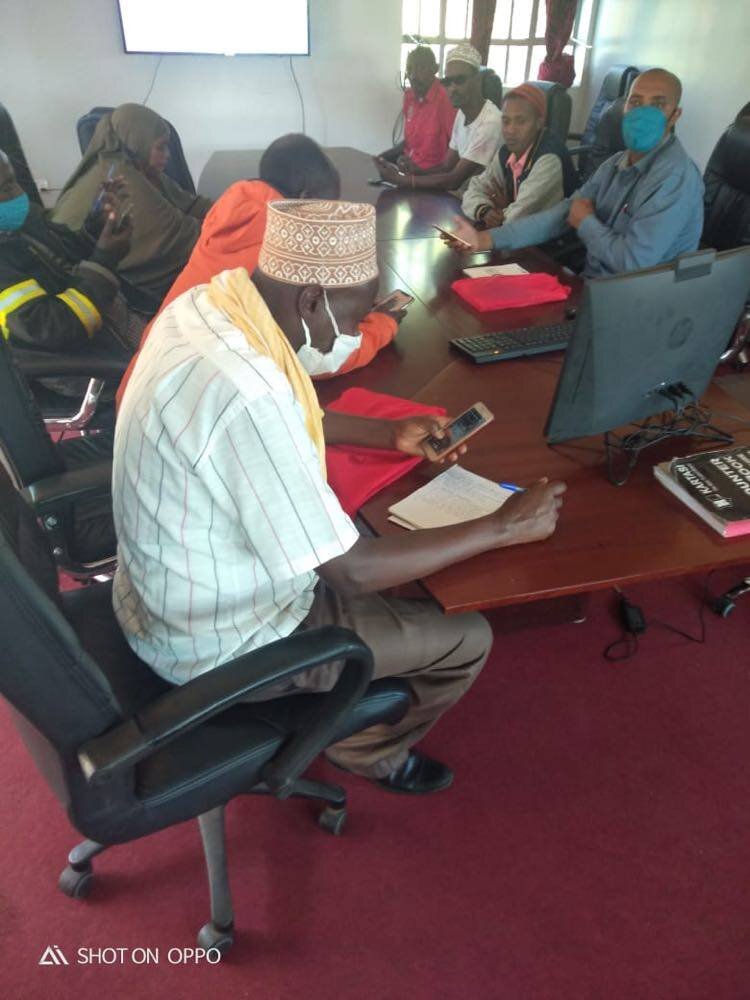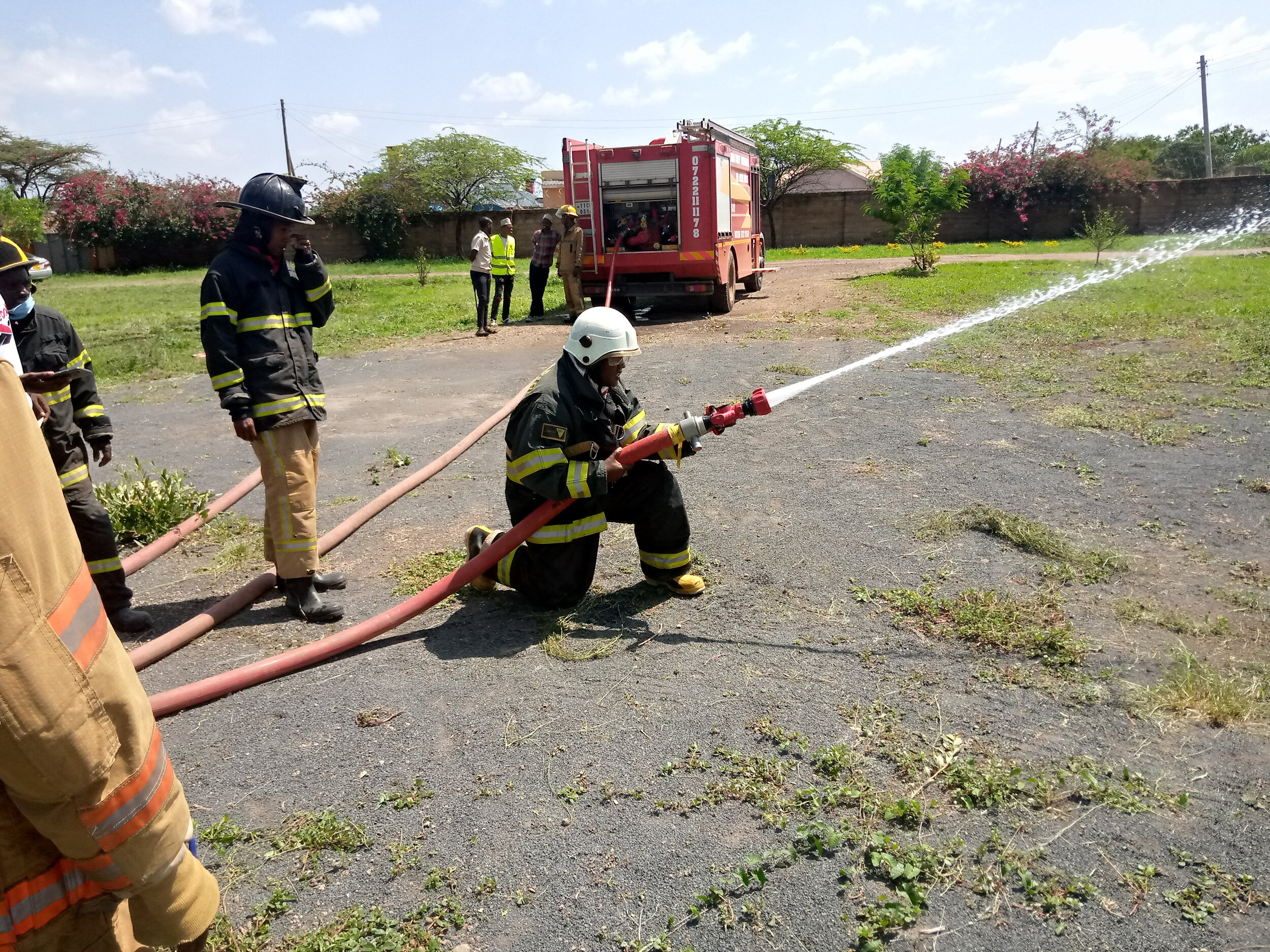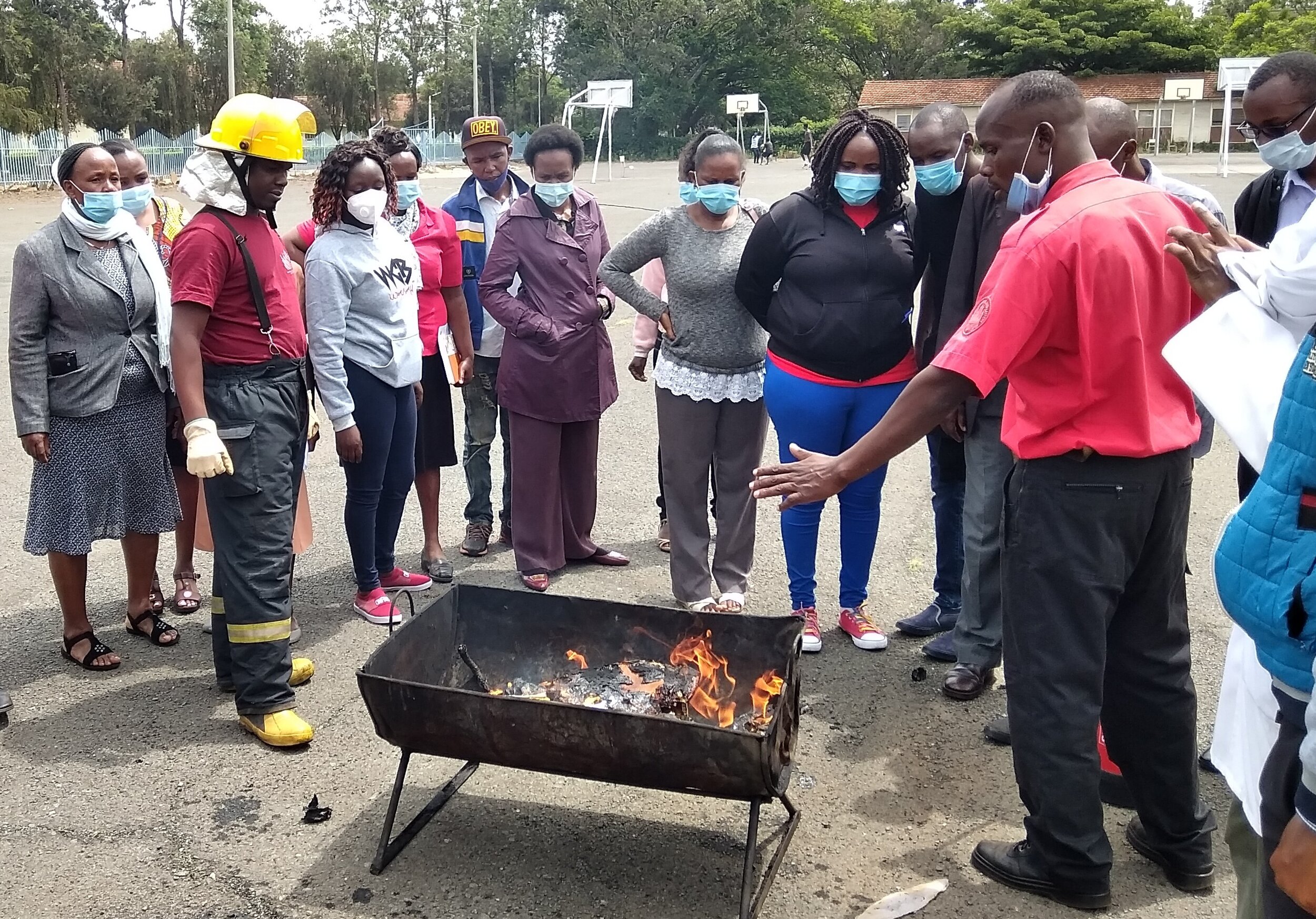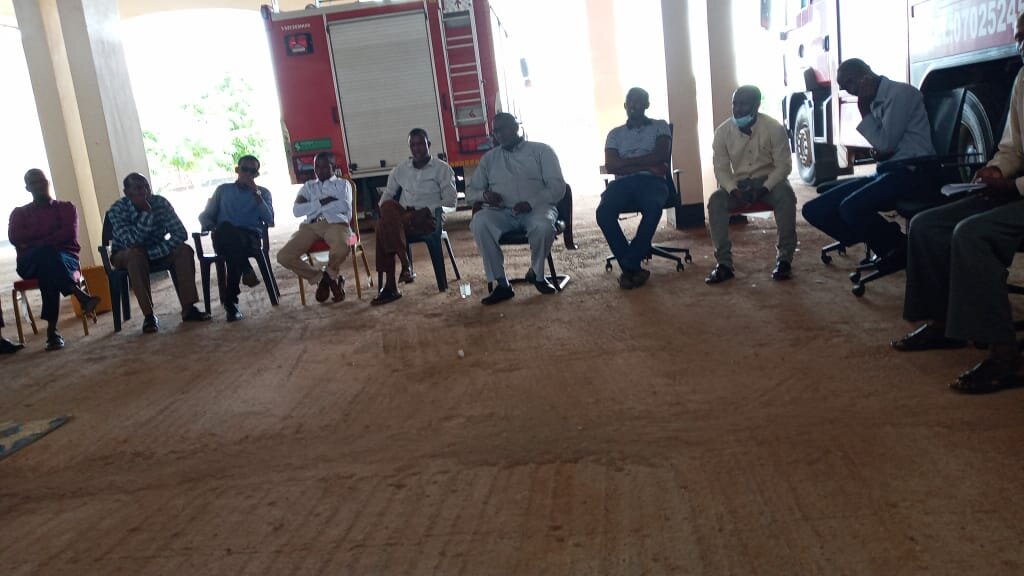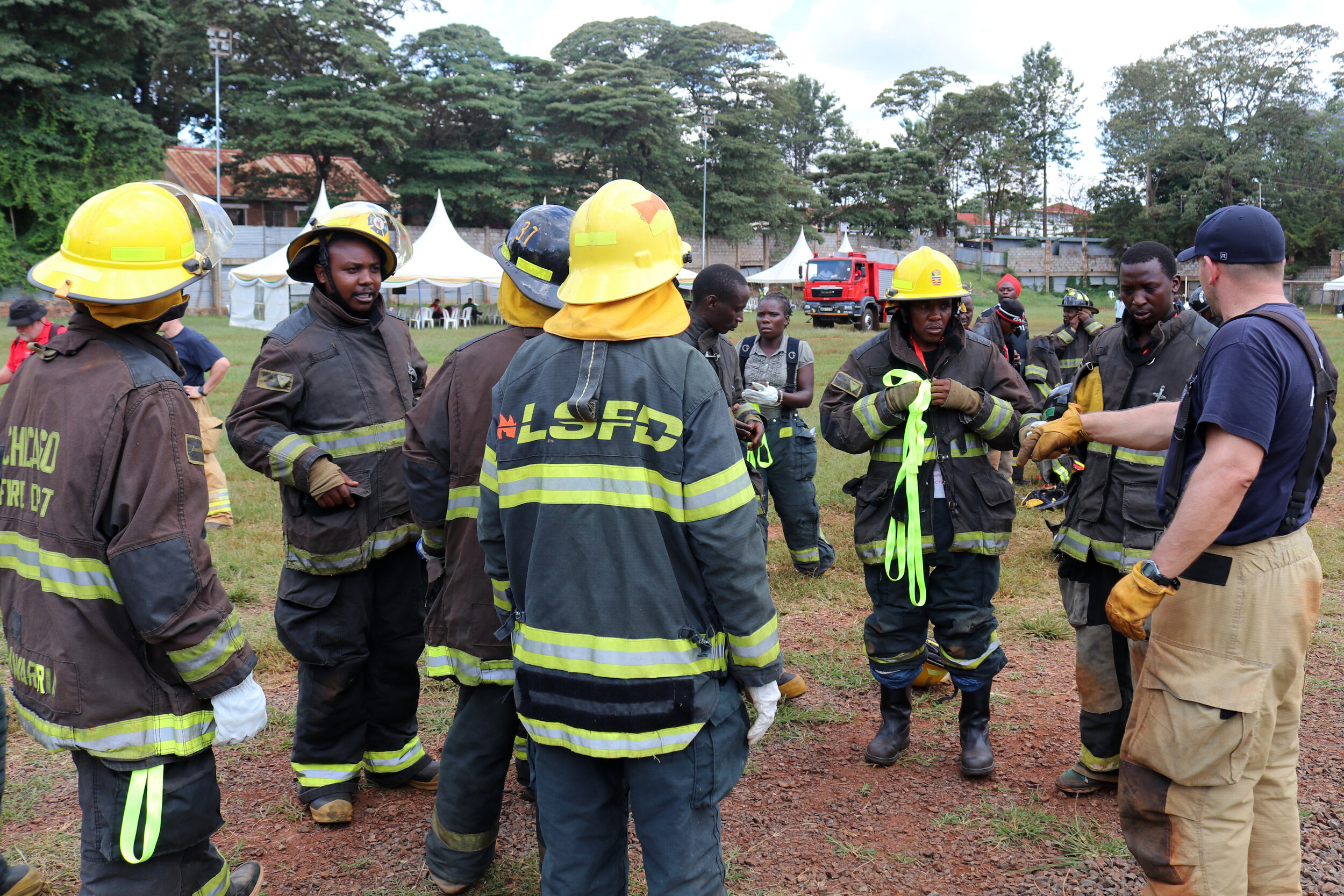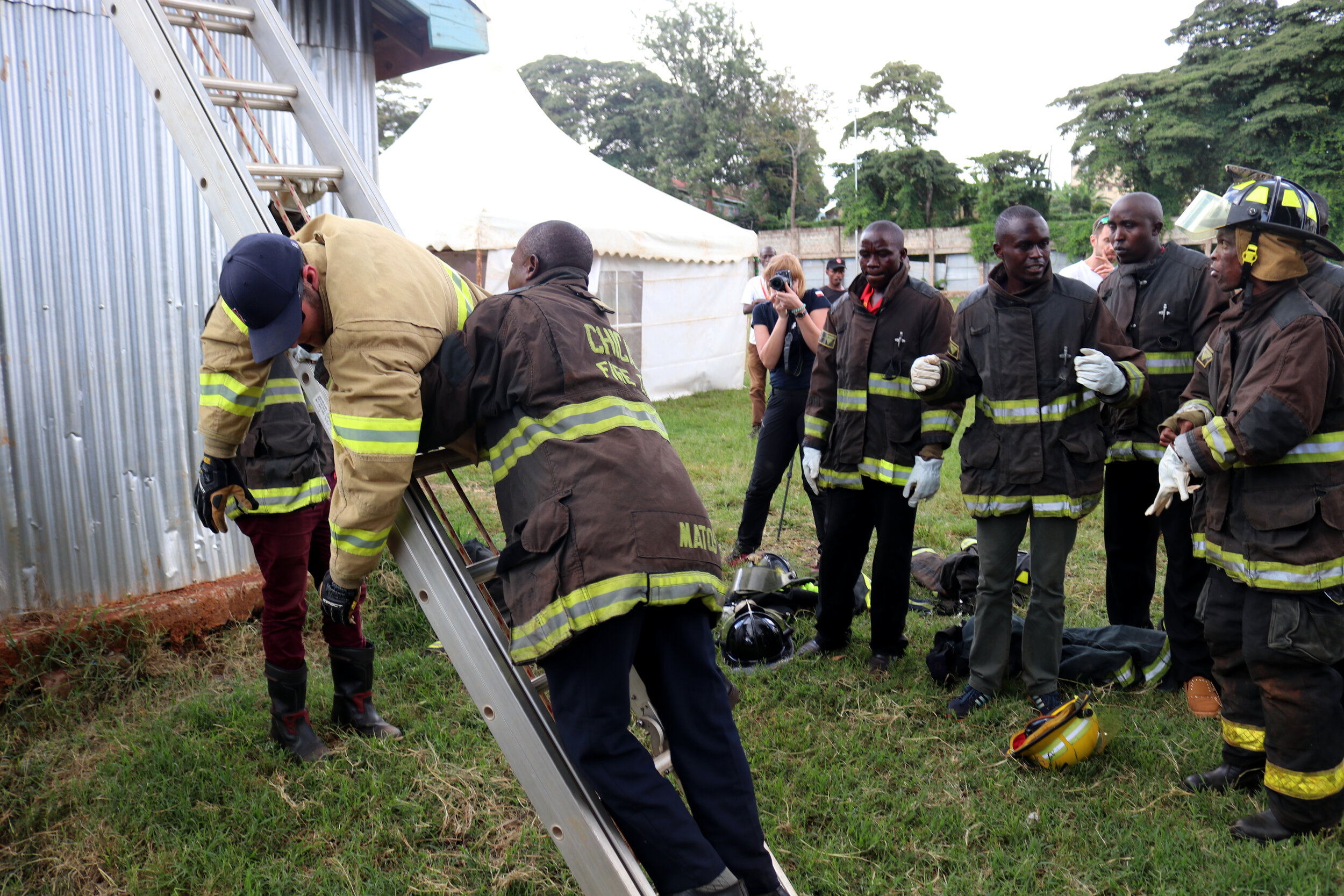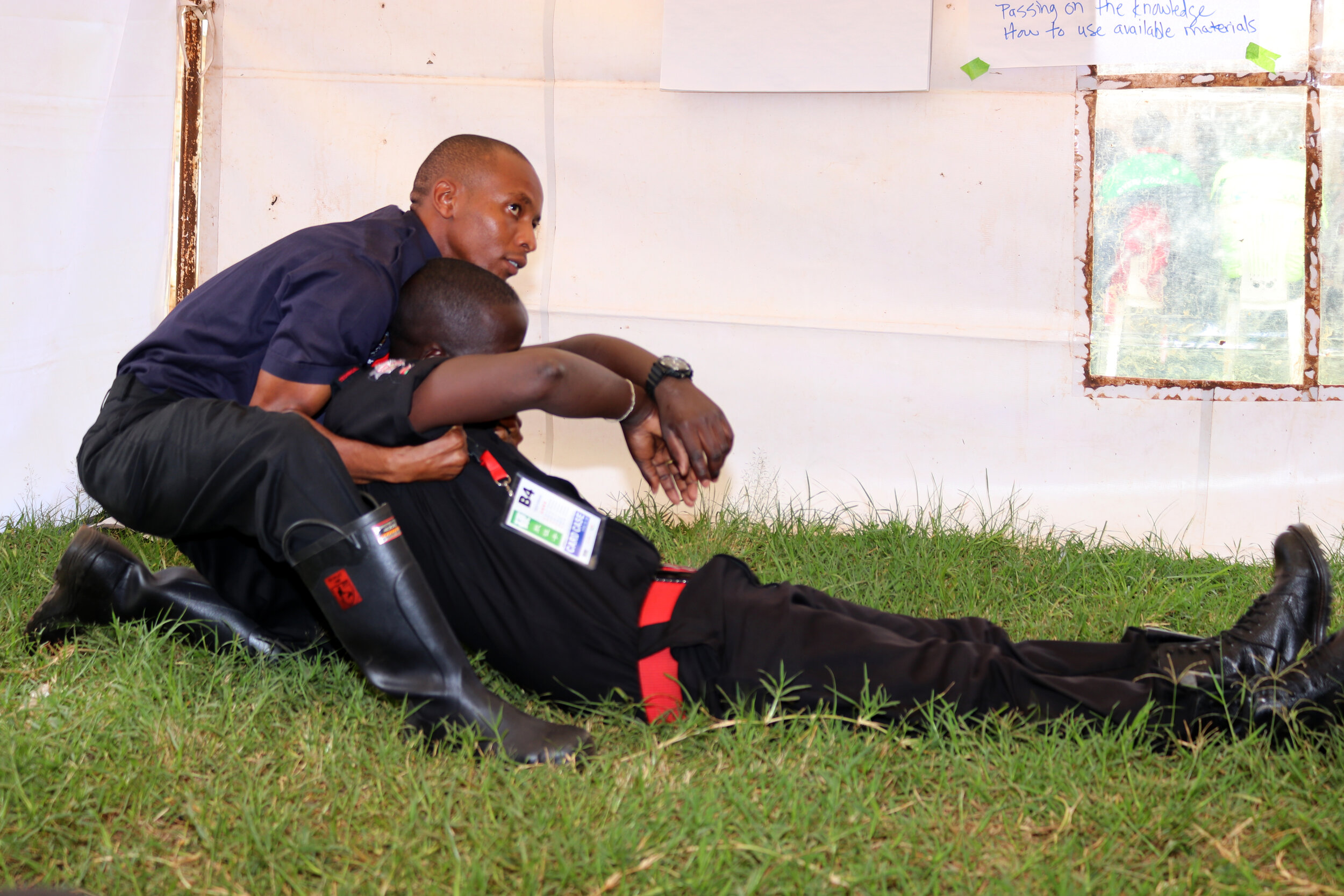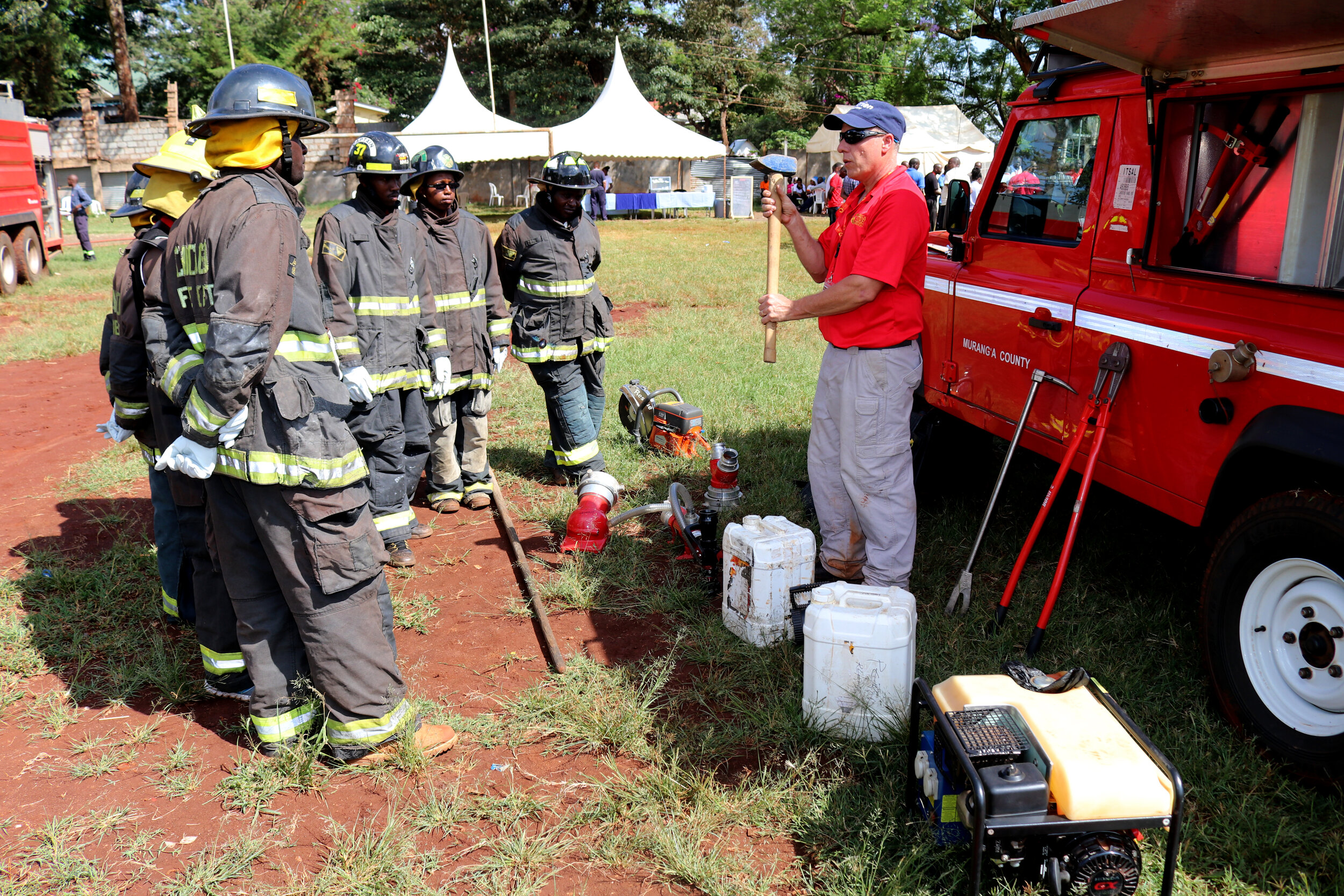In 2025, a team of firefighters from the US and Kenya traveled to Malawi for firefighter instruction and fire safety training. During this trip, three AFM team members had the unique opportunity to present fire evacuation trainings to a group of deaf and blind students in Mzuzu, Malawi. This school has not participated in any modern fire evacuation trainings or drills until this year when the AFM team visited. These drills sparked curiosity and excitement about fire safety in the students and their teachers which quickly spread to the wider community.
Making an Impact - Stories from Malawi 2024
Malawi: How the Future of Their Fire Service is Bright
By: Brad Banz
I was blessed to be a part of the recent AFM team that travelled to Malawi in June. During our trip, our team split up to visit all four fire brigades in the country. We shared our knowledge and provided equipment to better allow them to execute their jobs.
I have been working with AFM, almost since their beginning, making my first trip to Kenya with Dave and Nancy Moore in 2015. I have been travelling to Kenya since 2009, working in the Mathare Valley with church mission groups. My interest in the Kenyan fire service was boosted after a trip to Kenya was cancelled in 2013, due to a victim of a fire in the airports arrival hall the day before we were to arrive. What does this have to do with Malawi, you might be asking? In terms of resources, the Malawi fire service is where Kenya’s was 10 years ago.
As I alluded to earlier, Malawi has four fire brigades for a country of 18 million people. The firefighters have no uniforms, their apparatus and PPE are donated from other countries. From what I could see, less than half of the apparatus’ were in working condition. The fire brigades do not have their own stations, but are instead collocated within public works facility, using whatever leftover space is afforded to them. While the state of the fire brigades are saddening, they are not surprising. Malawi has the 12th poorest household income in the world.
Something that also stuck with me was an interaction I had with one of the firefighters. While firefighters were building a wood fire to heat the cooking oil for our fire prevention demonstration, one of them shared with me that his wife woke up every morning at 5, built such a fire, heated water, and put in a basin so he could bathe and got to work. This is an example of how little their firefighters are getting paid in this country. Living in homes without hot water is a struggle very few of us can relate to- and it reminds me of how blessed I am to have the resources I have. Despite these limitations, like most firefighters, they get the most they can out of the resources at hand.
Zomba firefighters stopped a fire in a small attached building from spreading to a much larger one. The Lilongwe Chief was summoned to city hall to answer for a fire that burned the top floor of a six story building. His firefighters couldn’t get to the sixth floor because they didn’t have the hose. Using what they had, they confined it to the top. What Malawi does have is firefighters who are eager to do the job. This is the best resource any fire brigade can have.
After visiting both, Malawi and Kenya are very different countries with different challenges. Our team all talked about how we could fix the problems, but it is a complex issue that will require that both us as westerners and the Malawians both quit creating a mindset of dependency and start helping them to develop. The changes that we have seen in Kenya are what the Malawi fire service can use as a benchmark to learn from.
Serving Firefighters in Malawi
June 5, 2023 a team of eight instructors for Africa Fire Mission set off from their homes in the United States, Germany, and Kenya. Our team members come from diverse experiences in the fire service.
We set off, with most team members having more than 30 hours of travel, to serve the firefighters in Malawi. There are 4 fire brigades in Malawi - Mzuzu, Lilongwe, Zomba and Blantyre and we were able to provide training at each station. After arriving in Malawi - our team divided into 2 smaller teams and traveled to each city.
Training topics and practical application was customized for each department and included: hazmat, rope rescue, hose management, ladders, interior search and rescue, CPR, first aid, and community fire prevention. While they were in Malawi the team went with the Fire Brigade to nearby schools and practiced showing the children fire safety!
Our team found it encouraging to see how the firefighters had furthered their trainings form our work in 2022 and improved their skills. Firefighters in Malawi work so hard and deserve the respect that they are gaining from their communities! Chief Mike Kull said, "It is such a pleasure working and training with these firefighters who are so dedicated to their profession and so willing to learn and train." Additionally, we were able to donate 15 sets of PPE to the firefighters this year and are making arrangements with the help of Malawi Goodlife to send more equipment to the fire service from Germany.
Chief Mike Kull trained in Blantyre and Zomba and blogged about his experience. If you’d like to read more about AFM’s mission to Malawi, check out Chief Kull’s blog: Far Off Chief.
Africa Fire Mission Supports Fire Service Development with White Papers
Africa Fire Mission Supports Fire Service Development with White Papers
by Nancy L. Moore, LISW-S, LCSW, CPCC, Executive Director and Co-Founder of AFM
It’s hard to believe that Africa Fire Mission has been working in Africa for over a decade. Since 2012, we have been working closely to provide training and consultation to the Fire Service in Africa. While our largest program is in Kenya, we have also worked directly in Zambia, Malawi, Ghana, Nigeria and Ethiopia. We have provided consultation or equipment in other countries across Africa as well.
As we support the fire service, we continue to look for ways that we can grow our impact. Our next step in supporting the African fire service in developing communities is by providing more advocacy resources that will help leaders in Africa to be able to support a well functioning fire service. In order to support our advocacy efforts, AFM is drafting white papers to help provide quality information for African leaders to support decision making with developing programs, making equipment purchases or accepting used equipment donations.
All too often AFM has seen situations when fire service leaders know what they need and have a hard time articulating the need or justifying the costs of quality programs and equipment to the government officials making the budgetary decisions. Our hope is to provide quality information that is designed to support these advocacy efforts.
Our first white paper is now available and addresses the need for a quality Breathing Apparatus Program. Let us know what you think. More importantly, please utilize the white paper as a tool for advocacy when you need support!
Africa Fire Mission Receives Major Grant from Motorola Solutions Foundation
For Immediate Release
August 29, 2022
Africa Fire Mission Receives Major Grant from Motorola Solutions Foundation
Africa Fire Mission (AFM) is a Cincinnati-based non-profit organization with team members of firefighters from across the United States, Canada and Europe who for ten years have provided fire training and equipment in various parts of Africa. AFM has announced that they have received a $25,000 grant from the Motorola Solutions Foundation to help continue its training programs and to provide a national Fire and EMS Training Symposium and Competition in Kenya in November 2022.
This grant will support hands-on Fire Training and distribution of firefighter personal protective equipment (PPE). In November, a team of twenty-two firefighters, paramedics and nurses from the United States and Canada will train over 350 Kenyan firefighters and EMT’s at the Jomo-Kenyatta International Airport in Nairobi, Kenya.
AFM’s training team members volunteer their time and pay their own expenses to travel to Africa to teach their fellow firefighters the latest techniques in firefighting, rescue and emergency medical services.
“Africa Fire Mission is grateful to Motorola Solutions Foundations for its continued support of our programs through this grant. Through continued partnership, we will be able to continue to impact communities and support firefighters in Africa as they strive to save lives and property” says Nancy Moore, Executive Director for Africa Fire Mission.
The Motorola Solutions Foundation, which has donated $100 million over the past 10 years, focuses its giving on three key areas: first responder programming, technology and engineering education, and programs that blend the two. The Foundation has a long-standing commitment to supporting programs that benefit underrepresented populations and aims to partner with organizations that align to its values of accountability, innovation, impact, diversity and inclusion.
The Motorola Solutions Foundation is proud to partner with organizations like Africa Fire Mission that share our values and passion for driving positive change in the community,” said Karem Perez, Executive Director of the Motorola Solutions Foundation. “We believe in the work that Africa Fire Mission is doing and look forward to seeing their continued impact.
For additional information on the Motorola Solutions Foundation grants program, visit: motorolasolutions.com/foundation-grant-partner.
For additional information regarding Africa Fire Mission visit: www.africafiremission.org - Contact Nancy Moore at 513-620-4236 or nancy@africafiremission.org
About Africa Fire Mission
Africa Fire Mission is a nonprofit organization committed to increasing the sustainable capacity of Fire Departments in developing communities. We accomplish this through training, empowerment, support and encouragement.
· Train – We partner with governments, NGO’s, missionaries, schools and corporations to provide education and training to firefighters and local communities. We use Community Health Education to teach firefighters and community members in Africa to protect themselves from the dangers of fire. We provide fire prevention training and fire safety assessments to schools ensuring the students are able to learn in an environment safe from fires.
· Empower – We work to increase the ability of communities in Africa to respond to disasters and provide relief when disasters occur.
· Support – We provide personal protective equipment and communication tools to fire services throughout Africa to allow fire departments to operate in a safer and more coordinator manner.
· Encourage – We build the capacity of African fire services so that local communities are able to provide sustainable public safety and disaster management services.
Where does AFM work?
Africa Fire Mission currently works in 6 countries throughout Africa including: Ethiopia, Ghana, Kenya, Malawi, Sierra Leone, and Zambia. In 2022, we are expanding our consultation work into Nigeria. In 2018, a request to expand our services into Ukraine has led us outside of Africa and into Europe.
About the Motorola Solutions Foundation
As the charitable and philanthropic arm of Motorola Solutions, the Motorola Solutions Foundation partners with organizations around the globe to create safer cities and equitable, thriving communities. We focus on giving back through strategic grants, employee volunteerism and other community investment initiatives. Our strategic grants program supports organizations that offer first responder programming and technology and engineering education, and align to our values of accountability, innovation, impact, diversity and inclusion. The Foundation is one of the many ways in which the company lives out its purpose of helping people be their best in the moments that matter. For more information on the Foundation, visit: www.motorolasolutions.com/foundation
The Fastest Two Weeks
By: Chief Mike Kull
After months of planning and meetings online, our team arrived in Blantyre, Malawi and it was stunningly beautiful. I’ve worked and traveled in East and Southern Africa but this country stood out to me. We sat down for a meal together to have our first face to face meeting. Breaking bread together is an important part of what we do here. Most of us knew each other and had worked together before but there was a new member of the team. With such a small team, we were going to be like family before we left. We had two days per city in three major cities while we were there and we were anxious to get going.
Our two days in the first city, Blantyre, flew by. We didn’t really have a plan going into it but our team quickly adapted to teaching together like we had done this a thousand times before. We tried to jam as much as we could into these two days and it was a real success. How do we know that? As we were having our team debriefing during supper the second day, we got a message that there was a fire reported in a slum area of the city. A while later we received another message saying that they had successfully extinguished the fire using some of the tactics that we had taught them. What great feedback for our two days of training.
Our travel days allowed us to decompress from the crazy few days of thinking on our feet. We toured the Namikango Mission, one of the AFM mission partners in Malawi. They are doing some great work in the community with a Maternity Clinic, a Discipleship Training Institute, a plantation, and Coffee Farm and Roastery. While we weren’t scheduled to visit the Fire Station in Zomba, we stopped in for a quick visit. They were extremely lacking in resources but we were very encouraged by the positive attitudes of the firefighters working there.
Our next two days of training in Zomba go very quickly again with great success. We weren’t planning on doing any medical training but saw a need after arriving to teach some life saving skills in CPR and bleeding control. We spent some time teaching vehicle extrication with hand tools. While on a break, we began going over a set of hydraulic extrication tools that had not run for the past thirteen years. With some work, will power, and a few tools we had packed, we got the power unit running and the tools are now on the truck ready to be used out in the community. We left Zomba feeling like we had made a real difference. That was the reason we were all there.
Our next travel day took us to Lake Malawi. The Lake is such an incredible resource for the country and no trip here is complete without a visit. We only had a few hours by the Lake but it was a good chance to recharge our spirits and prepare for our final two days of teaching.
Our last two days of training were in the capital city of Lilongwe. Even in the Capital, they struggle with having the equipment they need to serve the city. There was only one functioning fire truck and it was on loan from the airport. What is so inspiring working in Africa is how dedicated these men and women are to serving their communities despite the lack of resources they have. While we were there we had a unique experience that was not on the schedule. We ended our training early our first day because the Fire Brigade had to standby at an Africa Cup of Nations (football/soccer) qualifier game between Egypt and Ethiopia. We were invited to come along and we quickly agreed, riding with the firefighters on the Engine to the stadium (with lights and sirens at times). Once we were there we split up into teams around the stadium. It gave us a chance to interact with the firefighters and work side by side with them. It was mostly uneventful but still an unforgettable experience. We wrapped up our last day of training with some extrication training and a live fire.
Our final day in Malawi was spent out in the villages with our mission partners at e3 Partners. They are doing some great work with sustainable farming and drinking water wells in the rural areas. We even got to do some fire prevention training in a remote village. Our Fire Safety Advocate, Jose, from Kenya did an awesome job engaging everyone in the village.
I am humbled and honored to say that I am a part of Africa Fire Mission. We all did this for different reasons. All of us want to share the knowledge and training that we have learned in the Fire Service with these developing nations. For me, it is also more of a calling. For me it is a way to carry out the Great Commission that was given to us in Matthew 28:19 “Go therefore and make disciples of all the nations…”
Working for Africa Fire Mission is a great way for anyone to grow mentally, emotionally and spiritually. You will be inspired as you work side by side with instructors from around the US and the world as well as with these amazing firefighters in developing countries. You will leave with your spirits raised, a new enthusiasm for firefighting and more than anything, a different perspective in life and on the world as a whole.
About the Author:
Chief Mike Kull has been serving his local community in rural Pennsylvania for 25 years. Chief Kull serves as Fire Chief and Administrator of his local volunteer fire department as well as serving as a local elected official and has served in various government roles for his entire career. He is also a Forest Fire Warden with the PA Bureau of Forestry and serves on his church council
Africa Fire Mission Receives Major Grant from Motorola Solutions Foundation
For Immediate Release
September 28, 2021
Africa Fire Mission Receives Major Grant from Motorola Solutions Foundation
Africa Fire Mission (AFM) is a Cincinnati-based group of firefighters from across the United States who for nearly a decade have provided fire training and equipment to several African nations. AFM has announced that they will receive a $ 30,000 grant from the Motorola Solutions Foundation to help continue its outreach to train several fire brigades in Kenya, Malawi, and Zambia through 2022.
This grant will support hands-on Fire Training and distribution of personal protective equipment (PPE) turnout gear scheduled for delivery in Kenya, Malawi and Zambia. The 2021 Kenya trip that will take place from November 10th to 21st, will be partially supported by this grant, as well as four other scheduled team trips in 2022.
This distribution of needed fire equipment and training is only possible through the generosity of such organizations as the Motorola Solutions Foundation funded through the Motorola Corporation, a world-wide leader in the field of emergency communications equipment. The AFM training staff consists of firefighters from departments that span across America, who volunteer their time and pay their own expenses to travel to Africa to teach their fellow firefighters the latest techniques in firefighting, rescue and emergency medical services.
“Africa Fire Mission is grateful to Motorola Solutions Foundations for its continued support of our programs through this grant. We will be able to continue to impact communities and support firefighters in Africa as they strive to save lives and property” says Nancy Moore, Director of Programs for Africa Fire Mission.
AFM is a 501c3 corporation headquartered at 1373West Galbraith Road in North College Hill, Ohio.
Each year, the Motorola Solutions Foundation’s awards grants to charitable organizations such as Africa Fire Mission to support three primary areas of focus: first responder programming, technology and engineering education and programs that blend the two.
"The Motorola Solutions Foundation aims to partner with organizations that align to our values of accountability, innovation, impact, diversity and inclusion," said Karem Perez, executive director of the Motorola Solutions Foundation. "We are proud to support organizations like Africa Fire Mission that embody these values while driving positive change in their communities.”
For additional information:
Motorola Solutions Foundation grants program: www.motorolasolutions.com/foundation - Contact Sarah Packard at sarah.packard@motorolasolutions.com
Africa Fire Mission: www.africafiremission.org - Contact Nancy Moore at 513-620-4236 or nancy@africafiremission.org, or Robert Rielage at 513-728-9978.
There are 4 fire stations in Malawi!
by Nancy Moore
We’d last been to Malawi in 2017 when Co-Founders Dave and Nancy Moore went on a vision trip. During that trip they worked to better understand the needs of the fire service and their dreams of the future as a better fire service. Lodious - the Fire Chief in Zomba, Malawi has a vision for Malawi’s fire service and made sure to share it with us.
Malawi has four fire stations - you read that right - four. For perspective land mass wise, Malawi is about the geographic size of Pennsylvania and there are four fire stations and less than 100 firefighters in the country. Firefighters are misunderstood by their community and under equipped to serve the communities where they are located. Firefighters are often stoned and ridiculed by the communities they are trying to serve.
AFM began looking for the right partner that could help us reach out and train the firefighters and the community across Malawi. Our friends at Namikango Mission were part of that next step, and something was missing. During conversations with Parkview Global, Orland Park, IL and their initiative for Peace Plan Malawi it became clear that we’d be able to partner with Peace Plan Malawi and reach the fire service across Malawi.
Finally, in June 2021, we were ready to travel with a team from Parkview to serve in Malawi. God provided a way for us to go even when the borders were closed to foreigners due to contacts in Malawi’s National Government and Department of Health.
While we were in Malawi, we we able to provide firefighter personal protective equipment to the Zomba Fire Brigade.
We were able to train firefighters from 3 of the 4 fire departments in the country (Mzuzu, Lilongwe, Zomba)! It was difficult to see the lack of equipment, the lack of PPE and the broken equipment. At one fire station there appeared to be 4 fire trucks - as we asked questions we learned that only one was in working condition.
We were able to pray for the firefighters and share God’s love with them as we conducted training on hose operations, using ladders, and search and rescue operations.
In Lilongwe, we found out that there were new Jaws of Life (Vehicle Extrication tools) that had been sitting in storage for over a year because no one knew how to operate them - and we were asked if we could teach them - YES! In a few days time we trained on the new equipment and it was able to be put into operation at vehicle accident scenes to save lives!
We are looking forward to what our work will look like in Malawi in the future and are planning to take a team of firefighters to serve in Malawi in June 2022!! Learn more about our mission trips here >
Reflections on AFM’s first Virtual Fire Training Symposium
by: Hank Clemmensen, Board Member AFM; Retired Fire Chief, Palatine Rural Fire Protection District, IL
What a year 2020 has been in the United States, from COVID-19 to the protests and riots to some of the worst Western wildfires and hurricanes in the golf shores. At times, we forget that it hasn’t been any better in other parts of the world and some of those places are not as prepared to handle these types of disasters.
This is one of driving forces behind what we do at the Africa Fire Mission, why since 2012 we have traveled halfway around the world to help support the fire service in Africa. I’ve been participating in team trips with AFM since 2015. During the fall of 2019, I spent more than 5 weeks in Africa working with fire fighters in Zambia and Kenya, sharing leadership skills that I have learned in the United States during my career in the fire service. As difficult as that was for 5 weeks being in different countries and away from family, I would almost prefer it then teaching virtually.
Although Kenyans speak English, they prefer to speak Swahili with their own dialytic. When teaching in person, you pick up quick on their expression when you say something that they don’t understand. However, when doing a virtual class, not until you get their homework or quiz back that you realize they missed some of main points of the lecture.
It was not until late summer that the final decision was made that we would not be traveling, and we were going to do a virtual symposium for the firefighters in Kenya. Now how do we this virtual online training with volunteer instructors, no budget for IT support, little or no experience with putting together a virtual training symposium, and about 4 months to put it all together. Not to mention the 9-hour time difference and the limited internet access in Kenya.
My first thought was that if my grandkids can do remote learning at home, I should be able to handle one forty-hour class. A big thanks to Nancy Moore and the hours she put into setting up Google Classroom for this virtual learning. The first challenge was to learn all I could about Google Classroom, and then figure out how to record the training since it would not be practical to try to do this live with the time difference. Then of course, editing of those videos we recorded, which was a real learning process. Let us not forget we had to come up with the class content, quizzes, and homework. Now I remember why I gave up on secondary education and went into the fire service.
The good news was that most of the instructors for the different classes worked in teams. I was fortunate enough to have Chief Kevin Milan, with the South Metro Fire Rescue in Colorado and Rick Best from the National Fallen Firefighters Foundation working with me on the Leadership class. We created are videos with Zoom, which allowed us to have guest speakers join in and with some of my new video editing skills, it looked like we did it all in one take.
Another big issue was Internet access for our students and having enough band width to play all the videos and being to download the Google Classroom documents. It appeared that most of the students used their cell phones to access Google and complete their homework assignments/quizzes. It was amazing to see how hard they worked to make sure that homework was completed and submitted. Although we may have better Internet access in the US, the firefighters in Africa really have the drive to make the technology work for them.
Being the first virtual Fire Symposium in Africa by Africa Fire Mission with more than 600 students from around the world (more than 16 countries represented), 20 volunteer instructors, and in the middle of a Covid-19 pandemic, I believe it was a great success. Firefighters in Africa have proven again that they are extremely motivated to continue their mission to learn and improve the fire service their countries. Every year I make new friends and learn so much from our brothers and sisters in Africa which is why I look forward to returning to Africa in the Fall of 2021.
For more information about AFM’s Mission’s in 2021 check out: Join a Mission
Be Wise about Maintenance
By: Brian E. Burkhardt; Chaplain, Retired Greenfield Firefighter/Paramedic, City of Greenfield Fire Territory Indiana, USA.
Our job as a firefighter, engineer, officer and commander is hard enough without having equipment failure. We can prevent many of these failures by preventive, continuous and routine maintenance. We know how hard it is when we cannot respond because our apparatus is out of service. We also do not provide the proper level of service to our community. Here’s a simple and useful system to follow and implement:
Be WISE.
W- Walk around the apparatus.
I- Inspect the apparatus.
S- Start and run all the systems.
E- Operate all the Equipment.
Let’s look at each letter on an individual level.
W - Walking around the apparatus we can tell if there are any major problems. Is there a leak of fluid, a smell or odor, a sound, or anything that was not there the last time we operated the apparatus. During this walk around we are using not just our eyes but all of our senses to look for issues to address.
I - Inspection of the apparatus. This is when we start looking at all the systems individually. Checking the systems before we operate them is an important step. We need to check all the fluids and belts. We want to check all the possible areas of failure before we start the equipment.
S - Start and operate each system. Drive train, Pump, Emergency warning system, Doors, Windows, Compartment doors.
E - Operate all Equipment. If it has moving parts, operate them. It if runs, start it. If it requires fuel or oil check and fill them, If you find a problem or it does not work. Fix it or mark it out of service and notify the person in charge that can get it fixed.
Note that we need to keep a journal of the maintenance we preform and any problems we find. This can help us recognize failures that occur more than once. When you journal, list the date, time, and who was performing the apparatus check. If you fix repair or remove something from service document it.
Only document facts not opinions. This journal is where your are going to look in the future to see if there is a common problem that occurs on a regular time schedule or after a common emergency.
If you have a maintenance program, review and update it at least once a year. If you do not have a program it is never to late to start!
Please post any thoughts or comments about this article on the AFM Africa Firefighters Networking page: https://www.facebook.com/groups/africafireservicenetworking/
Conducting Regular Training at your Fire Station
by Jon Seastone
Jon is a structural and wildland firefighter with the Denver Fire Department, Colorado. Jon has been training with AFM since 2017 in Kenya.
Company training is of vital importance to fire crews. Small problems often happen during fire calls and company training can help to minimize those problems and prevent small problems from becoming big problems. Laziness and complacency is a recipe for disaster when an overwhelming emergency call rears its ugly head. Company training also develops camaraderie betweens firefighters and builds teamwork. Because firefighters took the time to train prior to arriving at a fire scene, fire companies will have a sense of what their fellow crew members will do, sometimes without the need to verbally communicate the actions. Firefighters who regularly train together feel like they can “read each other’s minds” during incidents because drilling causes a team to move as one force. For these reasons, daily company drills and training is of vital importance.
Company training does not have to be a grueling or extensive process. It can be as simple as taking one item off the truck and becoming familiar with it or driving around your response district and familiarizing the company with buildings and target hazards. Being deliberate and disciplined in doing daily training becomes a habit and continuously develops knowledge within a firehouse.
When firefighters are sleep deprived, fatigued, hungry or distracted by other parts of our life, we must depend on our training as a foundation to help push through when our mind may not be operating at maximum levels. By running through scenarios and putting hands on equipment, we develop muscle memory that will take over in times of stress. We can then build on these scenarios and find additional “outside the box” scenarios or possible plans “B” and “C” if plan A fails.
During company drilling equipment is taken out and checked, and used for training, then cleaned and put back in service. Often, problems with the equipment may be discovered and can be resolved prior to an incident. It is best to immediately remove damaged or non working equipment from service till the issue has been resolved or the equipment has been repaired. It’s a very empty feeling to be in the middle of an emergency call and have an equipment fail that might have been discovered had the equipment been used for training.
Company training and drilling require intentionality. Every firefighter can step up and come up with training to pass onto others. Senior firefighters need to be deliberate about training with younger, less experienced firefighters. These more senior members can pass on stories and experiences that are invaluable in giving younger firefighters the knowledge of past calls and experiences that they can use as preparation for future emergencies that they might encounter. Senior firefighters are the leaders within the firehouse that can encourage others to take the reigns and pass along knowledge thereby making the fire service better in the future. The best thing a senior firefighter can do when faced with a question or scenario is be humble enough to say,”I don’t have an answer, but let’s try to figure it out together.” They can lead by example by being the hardest workers in the firehouse.
The fire service is built on “never stop learning” mentality. It does not necessarily mean that departments must reinvent the wheel; but instead build on previous foundations and find new ways to accomplish tasks. The responsibility does not always fall on the chief or upper management. Although the Chief does have some culpability when it comes to training, training and drilling has been and will continue to start at the lowest level of the fire service, in other words with the firefighters.
Here are some examples of drills/training that firefighters can do in their own area:
Practice rescuing each other using drags and carries. What will you do if you have to rescue each other out of a building or a window? What if you have rescued a civilian in the same ways?
Have a discussion about the types of buildings within your response areas. What are some target hazards or places that could be exceptionally dangerous for firefighters and how will you respond to those hazards? Discuss and plan possible responses within your company.
If you carry ropes on your truck, pull those off and tie knots with each other. Teach each other useful knots that you know but maybe the firefighter next to you might not. When you are done, check the rope for damage.
Practice throwing ladders to various buildings and techniques for taking victims down the ladder.
Practice searching for people or following a hose pipe in the firehouse while blindfolded to use your other senses in case you can’t see during a fire.
Watch videos of firefighter training from all over the world and then try it yourself to see if it works for you.
These are only a few examples. What are your ideas? Add your ideas to the AFM networking group because we can all learn from each other!
Recommendations to Keep Your Workplace Safer During the COVID-19 Pandemic
by: Brad Banz- Retired Fire Chief, Colwich Fire Dept., Retired Captain Wichita Fire Dept.
Greetings! I pray that everyone is doing ok right now. I would like to share some ideas on what first responders should be doing around their workplaces to keep themselves safer from COVID-19. Although things are starting to relax in some areas, this doesn’t mean we can let down our guard, as the virus has not suddenly left and will continue to be a part of our lives for some time to come. Many first responders live with each for an extended period of time, especially firefighters. That’s why it’s so important that we do what we can to keep from sharing COVID-19 if one of us is unfortunate enough to contract it. Some of the things I’m about to share may seem basic - and I am sure many of you are already following many of the ideas. The purpose of this article is to stimulate thinking and help you as responders to come up with some new ideas if you haven’t thought of them. Please feel free to share other ideas in your response as well.
Probably one of the easiest things we can do is handwashing. Everyone should wash their hands thoroughly with soap and water for at least 20 seconds. Don’t use the same bar of soap and don’t share the same towel to dry with. Because first responders make frequent contact with the public, they should also wash their hands after contacting the public. If possible, keep hand sanitizer on your vehicles.
Next, lets discuss habits in our quarters. The first item I would like to discuss is social distancing. This may be the hardest for firefighters to comply with, because most firefighters love to interact socially. We need to take steps to minimize the number of firefighters in each space so as to comply with social distancing requirements. The solution to this would be to move activities to a larger area, outdoors perhaps. Keeping our quarters clean and sanitary should also be important – washing bedding and towels frequently. Take the time to clean and sanitize areas, especially surfaces with a disinfectant solution at least once a day, and preferably more. This should occur in the bedrooms, toilet facilities, showers, kitchen, common areas and officer. Finally, keep contaminated PPE away from common crew areas such as sleeping and eating areas and decontaminate it as soon as possible after responding to a medical emergency.
Although we are public servants and need to make ourselves accessible to the public, in these times we also have to be careful to protect ourselves, while still providing some type of public access. We must make it clear to the public that any visits to a fire brigade/fire department facility must be for business or emergency purposes only. The members of the public who are visiting must be required to wear a mask or be issued one upon entering. Only a limited number of visitors should be allowed into the facility, and then only to a restricted area.
Finally, training is one of the most important things that firefighters do. Reading these posts may be a part of your training. Sometimes our hands on training requires us to do things that put us into situations that break social distancing guidelines. Station officers and chiefs, we know how important it is to have good, comprehensive training for your crews. Right now, however, please try to plan your training so that your firefighters are doing activities which won’t compromise their health. There are still plenty of drills which can be conducted that don’t require your firefighters to be in close proximity to one another.
To summarize, we started off by discussing a basic but simple concept: handwashing. Next we talked about some things we could do in our quarters to help keep them cleaner. Restricting public access is important, and finally we wrapped up by making suggestions for changing training requirements. As I stated, many of these things may be already implemented by you already. Please feel free to share ideas you have with the group.
Recommendations for First Responders Responding to the COVID-19 Pandemic in Africa and other Developing Nations
by: Brad Banz- Retired Fire Chief, Colwich Fire Dept., Retired Captain Wichita Fire Dept.
Last November when I was in Kenya with Africa Fire Mission, I delivered training on responding to mass casualty incidents and response to biological and explosives terrorism incidents. Who knew that only a few short months later that we would be dealing with a pandemic situation that in many ways parallels what we might expect in a biological incident. I am not an expert on COVID-19, I don’t think anyone is, it is a rapidly changing situation. I would like to try my best to offer a few suggestions that may help deal with this crisis. I actually have several things to discuss, so let’s get started.
SYMPTOMS:
The first thing we need to talk about are the symptoms of COVID-19, or the Coronavirus, as some are calling it. The most common symptoms are a high fever, dry cough and tiredness. Severe cases will develop into difficulty breathing, usually some type of pneumonia. There are certain groups of people that should be protected as they are at a higher risk of contracting the disease and developing more severe symptoms. High risk groups include the elderly, those with heart conditions, high blood pressure and diabetics. Also, anyone with already weakened immune systems are at high risk.
PERSONAL PROTECTIVE EQUIPMENT (PPE):
COVID-19 can be spread very easily. It is important that you protect yourselves. One of the most basic things you can do is hand washing. Use hand sanitizer often and hand washing often. Wash your hands for 20 seconds using soap and clean water. My other safety concern for all providers is wearing protective equipment. I know for many of you it will be a struggle. Even in the US there is a shortage of proper PPE. In this regard, I have been praying for all of our responders to be provided with what they need. PPE necessary to protect you and it can help to protect in spreading COVID-19 to other patients. Please wear disposable gloves, eye protection (a face shield would be even better) and if possible an N95 mask. These are at the very least. If you have a patient that is coughing and especially if you don’t have the N95 masks or adequate protection for yourself, at least try to place a regular dust mask, an oxygen mask if you have one, or have them hold something over their mouth to keep their cough contained. If you have access to gowns, please dawn them as well. Firefighters, if you are responding and you have a patient with COVID-19 symptoms, wear your PPE, including your breathing apparatus if you don’t have a proper mask. Firefighter PPE should be properly decontaminated at the end of the incident. If you do not have access to PPE as a responder, consider the risk and the ways that you can protect yourself as best as possible – for instance, change your clothes after responding to the incident, wash contaminated clothing and take a hot shower as soon as possible.
TRIAGE:
Triage is going to become an important part of managing patients as we work our way through this crisis. You will not only be doing triage in the community on emergency scenes, but as the number of patients increase and resources become limited at the hospitals, triage will be more important there as well. Proper patient assessment and triage in the COVID-19 crisis is also essential to help keep COVID-19 patients isolated from other patients and hopefully keep the disease from spreading. For those workers who are assisting in the hospital setting, it is essential to establish triage on the very front end of the emergency department or hospital entrance. This is important so as to be able to triage and isolate potential COVID-19 patients away from other patients as soon as possible. EMS workers who are delivering patients in from the streets by ambulance, if you have a patient that is exhibiting symptoms of COVID-19, please take all safety precautions and advise the emergency department on arrival of a suspected COVID-19 patient so they can take proper precautions with PPE and isolate the patient.
Concerning triage priorities, please use normal triage priorities for all medical patients, here is a quick review of color coded triage priorities:
· black is obvious deceased or in a mass casualty incident a victim who is not breathing who is declared deceased because of resources. Remember in normal situations when you have the resources (manpower) you may attempt resuscitation on a non-breathing patient. If you don’t have resources they are to be triaged black.
· blue is pulseless and not breathing but is not used in mass casualty incidents;
· red is for critical patients who are suffering from potential life threatening illness or injury and is usually indicated by airway, breathing or circulatory distress;
· yellow patients are patients with potentially serious medical or trauma, but who are stable and can be delayed but still need care at the emergency room.
· green patients are non-life threatening emergencies.
A NOTE TO EMERGENCY MANAGERS:
You are a big part in helping out with getting through this crisis. If not, Fire or EMS managers may have to take dual roles. Emergency managers, it is your role to make sure that everyone works together with the end goals being to stop the crisis from getting bigger and taking care of who are sick. Emergency managers you will need to appoint a team to coordinate all that is involved. One of the biggest concerns that you will have as the situation grows is medical professionals. You must coordinate with the medical facilities and the government to make sure that you have proper staffing and that they are in the right places. The same goes with ambulances. You must work with the ambulance services to coordinate their care levels and transport destinations so hospitals aren’t overloaded. What facilities do you have available and what is their care level? Will you need to need to make temporary facilities for the overflow or for isolation? Is an option to make temporary facilities near informal settlements? Logistics is a big issue. You have to make sure that everyone has the supplies and equipment that they need. Consider how you will integrate with all levels of government, private industry. Think about coordinating with agencies such as the Red Cross, the UN, local community groups, community leaders and NGOs.
COMMUNITY SENSITIZATION:
Community involvement is of utmost importance. Africa Fire Mission has been deeply involved in promoting community sensitization through the fire service. Right now, the fire service and EMS should be in the community providing accurate information on COVID-19. While maintaining social distancing and adhering to emergency rules in place. Provide information about symptoms, and information about how to keep the disease from spreading. Information that can be helpful is such things as:
· Handwashing often and for 20 seconds at a time with soap and water or using hand sanitizer.
· Cover your cough.
· Social Distancing: Keeping a distance of at least 2 meters from each other whenever possible.
· If you have symptoms, do not go to work. People in risk groups (mentioned above) should stay away from others.
· If someone in your home has been diagnosed, everyone living in the home should stay at home.
· Avoid large groups as much as possible.
I know that some of these things may be extremely difficult to do for many community members. I know that water costs money. Perhaps you can enlist community organizations to help pay for water and soap so that families can afford to wash.
SUMMARY:
To summarize we talked about symptoms and risk groups, first responder safety, triage of both COVID-19 patients and medical patients in general, emergency management and involving the community.
First responders, a lot of responsibility is going to be on you during this pandemic. At Africa Fire Mission, we want to provide you will accurate and realistic information and response strategies based on what your situation might be on the ground. Hopefully I’ve passed on some information that may be useful. We are all still learning as we go.
ZOMBA, LILONGWE & BLANTYRE, MALAWI MAY 2017
Malawi is one of most beautiful places in the world and also one of the poorest. Landlocked in south-central Africa it is a heavily agrarian country that is prone to food insecurity (famine) and long-term power outages.
Nancy and I visited Malawi for 3 weeks in May at the invitation of Namikango Mission to explore how Africa Fire Mission could serve Malawi and partner with Namikango as a way to help their mission connect to the community. Missionaries Ryan and Justine had previously served at Missions of Hope in Kenya before moving to serve in Malawi 3 years ago. They had seen the impact AFM and MOHI had on the Mathare Valley and hoped to do the same in Malawi.
While in Malawi, we met with fire service leaders across the country to find ways AFM could minister to them. We learned that in Malawi, a country roughly the size of Pennsylvania, there are only FOUR fire departments and roughly 200 firefighters. Pennsylvania along has over 1800 fire departments. The country of Malawi has never bought any of their own fire trucks or fire equipment. They have relied on aid from the UK and Japan but they wish to change this. They wish to provide the services their communities needs with the right kind of equipment. The leaders are smart and know what it take to move forward but they just need some support and encouragement which Africa Fire Mission will be providing. The fire service leaders were impressed by the CHE curriculum that AFM has developed and were thrilled that we were able to train them and provide them copies of the training so that they could immediately go out in the communities and share the messages of both fire safety and God's love.
Moving forward, as a first step, we have invited the fire service from Malawi to attend the 2nd All Zambia Fire Academy in Lusaka this September. Zambia is a neighboring country and they Malawians a striving to emulate the successes that have occurred in the fire services across Zambia. We are looking forward to connecting our partners in Zambia and Malawi together as we all work to collaborate and provide strong and effective fire prevention and response services that will keep people safe!

